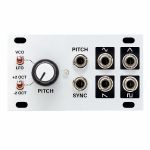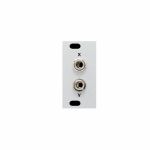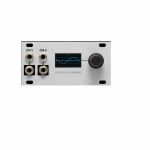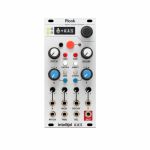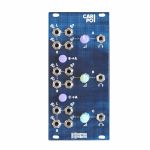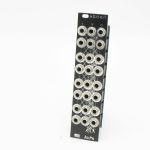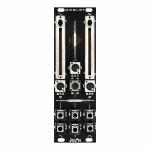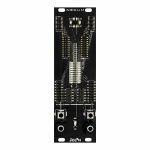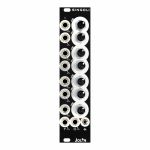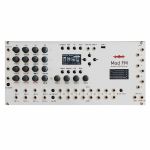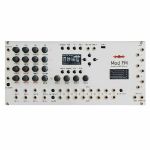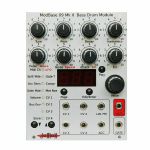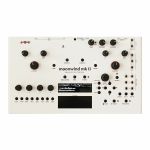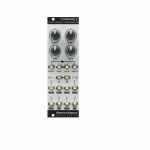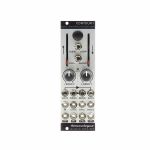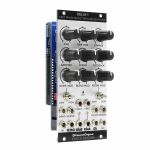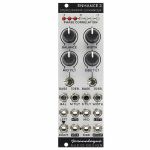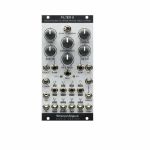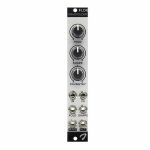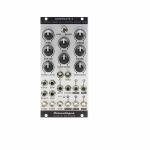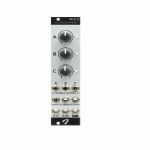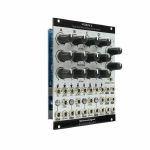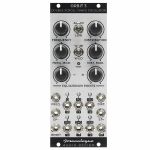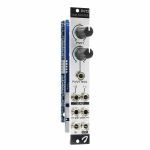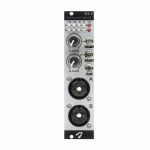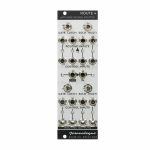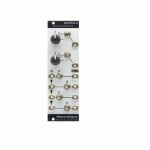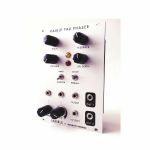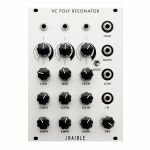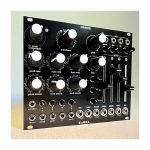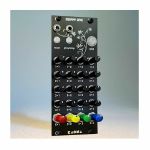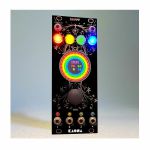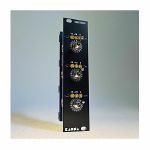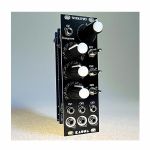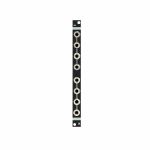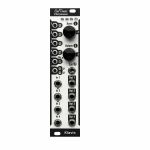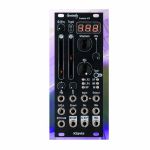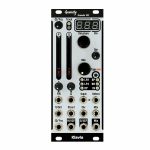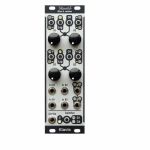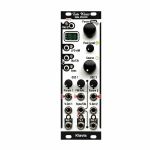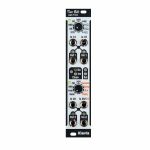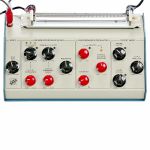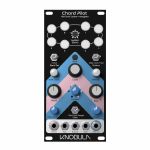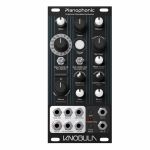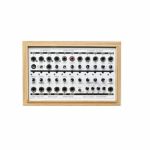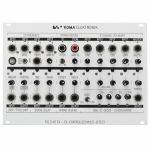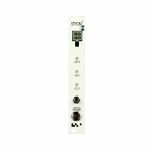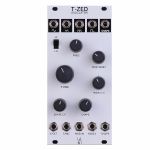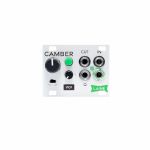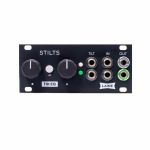安全购物
Studio equipment
Our full range of studio equipment from all the leading equipment and software brands. Guaranteed fast delivery and low prices.
安全购物
DJ equipment
Our full range of DJ equipment from all the leading equipment and software brands. Guaranteed fast delivery and low prices. Visit Juno DJ
Filter
Equipment
Format
Release Date
Price
Tags
Back catalogue: Studio Equipment
Juno's full catalogue of Studio EquipmentIntellijel VCO 1U Syncable Multi-Waveform Analogue Oscillator & LFO Module (oscillator/LFO module)
Cat: 839567 Rel: 20 Sep 21
Analogue triangle core oscillator & LFO module - 14HP
Notes: Mighty oscillations, mini size.
An analog oscillator and LFO with pure waveforms and precise tracking in a compact package. Perfect as a utility modulation source but equally capable to be used as a primary sound source. Patch it up and let it rip!
Features
Four simultaneous pure waveforms: Sine, Triangle, Square and Sawtooth
Pitch input for 1V/Oct tracking and FM
SYNC input for Hard Sync. This input has a comparator so that you can use a variety of waveforms as triggers.
Switch to select VCO (audio) or LFO range of operation
Three position Octave switch to jump pitch up or down by two octaves
PITCH knob has three octave range in VCO mode (extended to seven with the octave switch) and seven octave range in LFO mode (extended to 11 with the octave switch).
Bicolor led indicates the state of the triangle core rate
Specs
Width 14HP
Depth 37.5mm
Power 19mA @ +12V
16mA @ -12V
… Read moreAn analog oscillator and LFO with pure waveforms and precise tracking in a compact package. Perfect as a utility modulation source but equally capable to be used as a primary sound source. Patch it up and let it rip!
Features
Four simultaneous pure waveforms: Sine, Triangle, Square and Sawtooth
Pitch input for 1V/Oct tracking and FM
SYNC input for Hard Sync. This input has a comparator so that you can use a variety of waveforms as triggers.
Switch to select VCO (audio) or LFO range of operation
Three position Octave switch to jump pitch up or down by two octaves
PITCH knob has three octave range in VCO mode (extended to seven with the octave switch) and seven octave range in LFO mode (extended to 11 with the octave switch).
Bicolor led indicates the state of the triangle core rate
Specs
Width 14HP
Depth 37.5mm
Power 19mA @ +12V
16mA @ -12V
1 in stock $131.78
Intellijel XY I/O 1U TRS Jacks Module For Expanding Intellijel Modules (silver) (expander/dual/stereo/utility/external synth module)
Cat: 785358 Rel: 25 Jan 22
Conncector for Intellijel products
Notes: Convenient Connections
Use this module to tap into the 3-pin LINK connector used in several Intellijel products, including Mixup, Pedal I/O and the Palette and 2nd Generation Audio Jacks Board in a 7U case.
The XY I/O uses two 3.5mm TRS jacks, which accept insert cables to provide send/return capability to a pair of Pedal I/O's, or additional stereo inputs (or outputs) to a pair of Mixups, or one of each.
A third 3-pin Link connector on the back panel allows the X and Y jacks to access the L/R (or Send/Return) jacks on a single connected module or case without needing a stereo cable.
Width: 4HP
Depth: 24mm
… Read moreUse this module to tap into the 3-pin LINK connector used in several Intellijel products, including Mixup, Pedal I/O and the Palette and 2nd Generation Audio Jacks Board in a 7U case.
The XY I/O uses two 3.5mm TRS jacks, which accept insert cables to provide send/return capability to a pair of Pedal I/O's, or additional stereo inputs (or outputs) to a pair of Mixups, or one of each.
A third 3-pin Link connector on the back panel allows the X and Y jacks to access the L/R (or Send/Return) jacks on a single connected module or case without needing a stereo cable.
Width: 4HP
Depth: 24mm
1 in stock $18.27
Intellijel Zeroscope 1U Dual Channel Oscilloscope/Frequency Meter/Tuner Module (utility/tuner synth module)
Cat: 716898 Rel: 30 Jan 19
2-channel Eurorack oscilloscope - 16HP
Notes: Sometimes your ears are not enough and you really need to see the sounds and control voltages you are generating. Zeroscope's two channel design lets you display and compare both control voltages and audio. It's a good old fashioned sci-fi light show!
The Zeroscope 1U is an adaptation of the excellent 3U Zeroscope by VPME.DE.
Three Modes Packed Into 1U:
- Scope: Standard graphical display, with time displayed on the X-axis and voltage displayed on the Y-axis.
- X-Y: Alternate graphical display with CH 1 driving the X-axis and CH 2 driving the Y-axis.
- Tune: Alphanumerical tuning display, which you can configure to show either Hz values or note names.
The Scope displays have adjustable display offset for each channel and an adjustable trigger threshold, while the tuner has options for reference pitch and average update speed.
Ins & Outs
The inputs are DC coupled and accept signals between -10V and +10V. The Signal on the input is normalled to the output below; this allows you to monitor or tune a signal without a mult or re-patching.
… Read moreThe Zeroscope 1U is an adaptation of the excellent 3U Zeroscope by VPME.DE.
Three Modes Packed Into 1U:
- Scope: Standard graphical display, with time displayed on the X-axis and voltage displayed on the Y-axis.
- X-Y: Alternate graphical display with CH 1 driving the X-axis and CH 2 driving the Y-axis.
- Tune: Alphanumerical tuning display, which you can configure to show either Hz values or note names.
The Scope displays have adjustable display offset for each channel and an adjustable trigger threshold, while the tuner has options for reference pitch and average update speed.
Ins & Outs
The inputs are DC coupled and accept signals between -10V and +10V. The Signal on the input is normalled to the output below; this allows you to monitor or tune a signal without a mult or re-patching.
2 in stock $142.07
Click for better price!
or call +44 20 7424 1960
quote 716898
quote 716898
Intellijel/Applied Acoustics Systems Plonk Physical Modeling Percussion Synthesiser Module (silver) (digital/oscillator/noise/drum synth module)
Cat: 643387 Rel: 21 Aug 17
Physical modelling percussion synthesiser module - 12HP
Notes: Killer physical modelling module collab from two of the biggest names in their respective fields of hardware and software. Generates a huge range of percussion instruments plus synths and bass tones.
Supplier's notes:
Plonk uses a technique known as physical modelling to synthesize, with great realism, the way in which sound is produced by acoustic instruments. The Plonk module is, itself, focused primarily on creating percussive sounds - both pitched and un-pitched; natural and unnatural; acoustic-sounding or totally electronic.
Plonk does this by breaking sound creation into two distinct elements - the exciter and the resonator. The exciter is a mathematical model of the device used to strike a particular surface. Plonk, because it's percussion oriented, has two types of exciters: one modelled on a mallet, and the other providing a noise source. The resonator is a virtualization of the object being struck, which vibrates, resonates and creates the body of a sound. Plonk offers several types of resonators: beam; marimba; drumhead; membrane; plate; and string.
Plonk provides numerous parameters that let you shape, mould and design both the exciter and the resonator, thus enabling you to synthesize the sound of striking or scraping almost any type of object - real or imagined. In this way, Plonk can accurately model the sounds of kicks, snares, toms, cymbals, claps, tablas, congas and all manner of traditional percussion instruments. It can also model pitched percussive instruments, like vibes, marimbas, and even bass or guitar-like tones. Of course, it additionally excels at modelling instruments that heretofore never existed.
Best of all, the sounds created by Plonk are not static - any sound you design can respond dynamically to velocity, as well as four different modulation inputs. This means the sound of Plonk can change completely from note-to-note (or strike-to-strike). Because of this, Plonk is actually a duophonic (2-voice) module, which lets the sound of one note decay naturally when a second note (possibly employing an entirely different set of modelling values) is struck. Thus, hitting a new note does not choke the sound of the previously struck note (unless you want it to, of course)!
Plonk stores up to 128 patches in its internal memory, and ships with many presets programmed by professional sound designers and composers. You may overwrite these patches if you wish, and banks of patches may be transferred via MIDI System Exclusive over Plonk's built-in mini-USB port to facilitate offline storage by programs or websites that support this capability.
Plonk was developed in cooperation with Montreal-based Applied Acoustics Systems - physical modelling pioneers, and the creators of Tassman, Lounge Lizard, String Studio, Ultra Analog, Chromaphone and numerous other plugins. It is with great pleasure that Intellijel brings the potential of this physical modelling technology to a hands-on, CV-laden device capable of the sort of dynamic control and sonic exploration that modular synthesists demand.
… Read moreSupplier's notes:
Plonk uses a technique known as physical modelling to synthesize, with great realism, the way in which sound is produced by acoustic instruments. The Plonk module is, itself, focused primarily on creating percussive sounds - both pitched and un-pitched; natural and unnatural; acoustic-sounding or totally electronic.
Plonk does this by breaking sound creation into two distinct elements - the exciter and the resonator. The exciter is a mathematical model of the device used to strike a particular surface. Plonk, because it's percussion oriented, has two types of exciters: one modelled on a mallet, and the other providing a noise source. The resonator is a virtualization of the object being struck, which vibrates, resonates and creates the body of a sound. Plonk offers several types of resonators: beam; marimba; drumhead; membrane; plate; and string.
Plonk provides numerous parameters that let you shape, mould and design both the exciter and the resonator, thus enabling you to synthesize the sound of striking or scraping almost any type of object - real or imagined. In this way, Plonk can accurately model the sounds of kicks, snares, toms, cymbals, claps, tablas, congas and all manner of traditional percussion instruments. It can also model pitched percussive instruments, like vibes, marimbas, and even bass or guitar-like tones. Of course, it additionally excels at modelling instruments that heretofore never existed.
Best of all, the sounds created by Plonk are not static - any sound you design can respond dynamically to velocity, as well as four different modulation inputs. This means the sound of Plonk can change completely from note-to-note (or strike-to-strike). Because of this, Plonk is actually a duophonic (2-voice) module, which lets the sound of one note decay naturally when a second note (possibly employing an entirely different set of modelling values) is struck. Thus, hitting a new note does not choke the sound of the previously struck note (unless you want it to, of course)!
Plonk stores up to 128 patches in its internal memory, and ships with many presets programmed by professional sound designers and composers. You may overwrite these patches if you wish, and banks of patches may be transferred via MIDI System Exclusive over Plonk's built-in mini-USB port to facilitate offline storage by programs or websites that support this capability.
Plonk was developed in cooperation with Montreal-based Applied Acoustics Systems - physical modelling pioneers, and the creators of Tassman, Lounge Lizard, String Studio, Ultra Analog, Chromaphone and numerous other plugins. It is with great pleasure that Intellijel brings the potential of this physical modelling technology to a hands-on, CV-laden device capable of the sort of dynamic control and sonic exploration that modular synthesists demand.
2 in stock $306.77
Cat: 795944 Rel: 04 Mar 21
Headphone amplifier module
Notes: All channels support headphones with 16 - 600 Ohm impendances.
Superb sound with low distortion and great low end.
Linkable channels (B to A and C to A).
All inputs with multiples, ie feeding different mixer channels.
Mono input is normalized to stereo.
Protected with relais, assuring soft starts and DC protection for your headphones (> +/- 10V input)
Width: 12 HP
… Read moreSuperb sound with low distortion and great low end.
Linkable channels (B to A and C to A).
All inputs with multiples, ie feeding different mixer channels.
Mono input is normalized to stereo.
Protected with relais, assuring soft starts and DC protection for your headphones (> +/- 10V input)
Width: 12 HP
1 in stock $116.12
Click for better price!
or call +44 20 7424 1960
quote 795944
quote 795944
Jolin Agogo 8-Vactrol Low Pass Gates Module (low pass gate/mixer/utility/dual/stereo synth module)
Cat: 918361 Rel: 06 Jul 23
A pack of 8 vactrol low pass gates in an open design configuration.
Notes: AGOGO is a pack of 8 vactrol low pass gates in an open design configuration.
Why:
To bongo.
To enhance and enrich a weak audio source.
To create sub-mixes of up to 8 inputs.
To send a single source to many outputs and modulate each one of them individually.
With:
Multiple fixed waveforms - use the individual LPGs as a CV scanner.
Stereo sources - control them with a single CV input.
EOC pulses and triggers - this is where it gets percussive.
Slow modulations - take advantage of those vactrols and their natural decay.
How:
"I", the inputs row is normalized from top to bottom.
An input inserted in the first socket will be copied unaltered to the next one.
If a jack is plugged in it will break the normalization.
"V" is for control voltages and they cascade the same way as the inputs following to natural decay of the vactrol response. All the LPGs can be opened simultaneously with a single CV source. Combining the features of both "I" and "V" rows you can control a signal with 8 different CVs or 8 different sources with the same CV.
"O" stands for outputs. They act as an active mixer letting you combine up to 8 signals. As in the previous two rows, the connection can be interrupted in any given point to create sub mixes or individual outputs.
Since Jolin are actively summing copies of the original input, each LPG stage will add saturation to the final out. Thanks to the open design path and normalizations this is just an additional feature: all the LPGs can still be used individually or in multiple combinations for multichannel effects or other creative application. More AGOGOs can be chained together thanks to headers on the back to multiplicate the number of inputs/outputs.
Dimensions:
6 HP
28 mm deep
Current Draw:
150 mA +12V
90 mA -12V
… Read moreWhy:
To bongo.
To enhance and enrich a weak audio source.
To create sub-mixes of up to 8 inputs.
To send a single source to many outputs and modulate each one of them individually.
With:
Multiple fixed waveforms - use the individual LPGs as a CV scanner.
Stereo sources - control them with a single CV input.
EOC pulses and triggers - this is where it gets percussive.
Slow modulations - take advantage of those vactrols and their natural decay.
How:
"I", the inputs row is normalized from top to bottom.
An input inserted in the first socket will be copied unaltered to the next one.
If a jack is plugged in it will break the normalization.
"V" is for control voltages and they cascade the same way as the inputs following to natural decay of the vactrol response. All the LPGs can be opened simultaneously with a single CV source. Combining the features of both "I" and "V" rows you can control a signal with 8 different CVs or 8 different sources with the same CV.
"O" stands for outputs. They act as an active mixer letting you combine up to 8 signals. As in the previous two rows, the connection can be interrupted in any given point to create sub mixes or individual outputs.
Since Jolin are actively summing copies of the original input, each LPG stage will add saturation to the final out. Thanks to the open design path and normalizations this is just an additional feature: all the LPGs can still be used individually or in multiple combinations for multichannel effects or other creative application. More AGOGOs can be chained together thanks to headers on the back to multiplicate the number of inputs/outputs.
Dimensions:
6 HP
28 mm deep
Current Draw:
150 mA +12V
90 mA -12V
1 in stock $197.66
Jolin Goblet Analogue Filter & Distortion Module (distortion/effect/filter synth module)
Cat: 918471 Rel: 06 Jul 23
An 8hp analogue filter and distortion unit with some added quirks and extra controls.
Notes: GOBLET is an analogue filter and distortion unit with some added quirks and extra controls.
Why:
To make stuff sound filthy.
To shape the output of an oscillator.
To live interact with the sound during a performance.
To soft sweep the cutoff thanks to the optocouplers logarithmic response.
With:
Simple waves - make them unrecognizable.
Complex waves - shape them into something new.
Percussions - crank the resonance and give an acid twist to a beat.
No input - play with the feedback and the touch controls.
Dimensions:
8 HP
18 mm deep
Current Draw:
45 mA +12V
25 mA -12V
Whichever power connector you use should work fine with the polarity.
… Read moreWhy:
To make stuff sound filthy.
To shape the output of an oscillator.
To live interact with the sound during a performance.
To soft sweep the cutoff thanks to the optocouplers logarithmic response.
With:
Simple waves - make them unrecognizable.
Complex waves - shape them into something new.
Percussions - crank the resonance and give an acid twist to a beat.
No input - play with the feedback and the touch controls.
Dimensions:
8 HP
18 mm deep
Current Draw:
45 mA +12V
25 mA -12V
Whichever power connector you use should work fine with the polarity.
1 in stock $115.58
Jolin Nexum Smart Multi-Cable Tester Module (utility synth module)
Cat: 918461 Rel: 06 Jul 23
An 8hp smart multi-cable tester.
Notes: NEXUM is a smart multi-cable tester.
Why:
To test the unknown power cable of a fresh module.
To check if all the spaghetti is working before a gig.
To know if your power supply is well-mannered.
To mass produce cables and be sure that all of them are working.
With:
Eurorack 2.54mm cables - 10 pins and 16 pins ones.
Other 2.00mm connection cables - 20 pins headers.
JST 1.27mm cables - 20 pins headers.
Patch cables - 3.5mm TS & stereo - 3.5mm TRS.
How:
Plug a cable in one of the sockets and the other end specularly on the opposite side. Check if the blue LEDs light up steady in a number equal to the cores of the cable you are testing. Wiggle the wire back and forth just to be sure that all the individual cores are firmly connected.
Due to its configuration, the connection is considered true only if there is no continuity between the adjacent wires or discontinuity in that specific core. This smart feature will avoid false positives.
On top there are two LEDs indicators directly wired to the power lines to check if the -12V or +12V PSU power lines are misbehaving.
Dimensions:
8 HP
18 mm deep
Current Draw:
50 mA +12V
5 mA -12V
… Read moreWhy:
To test the unknown power cable of a fresh module.
To check if all the spaghetti is working before a gig.
To know if your power supply is well-mannered.
To mass produce cables and be sure that all of them are working.
With:
Eurorack 2.54mm cables - 10 pins and 16 pins ones.
Other 2.00mm connection cables - 20 pins headers.
JST 1.27mm cables - 20 pins headers.
Patch cables - 3.5mm TS & stereo - 3.5mm TRS.
How:
Plug a cable in one of the sockets and the other end specularly on the opposite side. Check if the blue LEDs light up steady in a number equal to the cores of the cable you are testing. Wiggle the wire back and forth just to be sure that all the individual cores are firmly connected.
Due to its configuration, the connection is considered true only if there is no continuity between the adjacent wires or discontinuity in that specific core. This smart feature will avoid false positives.
On top there are two LEDs indicators directly wired to the power lines to check if the -12V or +12V PSU power lines are misbehaving.
Dimensions:
8 HP
18 mm deep
Current Draw:
50 mA +12V
5 mA -12V
1 in stock $82.36
Click for better price!
or call +44 20 7424 1960
quote 918461
quote 918461
Jolin Singoli Combining Transient Detector Module (attenuator/envelope generator/expander/mixer synth module)
Cat: 946010 Rel: 06 Jul 23
A 7-channel DC coupled active combiner module in 6HP.
Notes: SINGOLI is a 7 channels DC coupled active combiner with an analogue transient detector output.
All the inputs I are equipped with LED meters and a dedicated attenuating potentiometer.
O will give you the combined mixed output.
T is an additional transient detector out that will fire only when a certain threshold is detected from the sum of all the inputs.
The toggle switch activates or deactivate the internal connection to Tutto&Sempre when the two modules are paired together thanks to the included JST cable.
Features
DC coupled mixer with 7 inputs and individual attenuators.
Intensity sensitive LED meters on all the inputs.
Analogue transient detector output.
Toggle switch to activate / deactivate its normalization to Tutto&Sempre.
"Whatever" power connector a.k.a. don't mind the polarity.
Technical Specs
Width: 6HP
Depth: 25mm
15mA +12V
10mA -12V
… Read moreAll the inputs I are equipped with LED meters and a dedicated attenuating potentiometer.
O will give you the combined mixed output.
T is an additional transient detector out that will fire only when a certain threshold is detected from the sum of all the inputs.
The toggle switch activates or deactivate the internal connection to Tutto&Sempre when the two modules are paired together thanks to the included JST cable.
Features
DC coupled mixer with 7 inputs and individual attenuators.
Intensity sensitive LED meters on all the inputs.
Analogue transient detector output.
Toggle switch to activate / deactivate its normalization to Tutto&Sempre.
"Whatever" power connector a.k.a. don't mind the polarity.
Technical Specs
Width: 6HP
Depth: 25mm
15mA +12V
10mA -12V
1 in stock $152.37
Click for better price!
or call +44 20 7424 1960
quote 946010
quote 946010
Jomox Mod FM 8-Voice FM Synthesiser Module (synth voice module)
Cat: 967072 Rel: 14 Nov 23
8-voice 4-operator FM synthesiser module - 56HP.
Notes: This long-awaited FM voice module from Jomox is a self-contained synth in Eurorack format, patchable and compatible with other modules but capable of creating eight-voice polyphonic patches all on its own. Vastly powerful.
Supplier's Notes:
The Mod FM is a completely self-contained 8 voice FM synth in eurorack format, which can create powerful sounds out of the box without lacking the commonly provided CV modulation possibilities.
It provides 4 Operators and 2 LFOs/VCOs per voice. Additionally it has 2 analogue filters and analogue VCAs per voice which apply analogue warmth and depth to the Mod FM, although the FM engine is digital of course.
Each voice has own CV/Gate inputs and an individual output. There is a mix output which separates even and odd voices. Here you can mix internal effects like delay and reverb to the stereo output signal.
Next to the CV/Gate control, the Mod FM has Midi in and out in TRS type A format and a USB C connector which handles Midi too.
Even without diving too much into complicated modular setups you can create extremely good sounding and metallic FM sounds, snappy bases but also soft and deep sounding analogue style sounds.
Furthermore, the Mod FM offers a variety of external cv modulations in order to e.g. modulate each operator individually or control the FM envelopes.
The Mod FM is fully multitimbral, i.e. each voice can play an own sound in Multi Mode which gets stored as a complete multi set (not only vectorized). That is, you can copy a single sound to the desired multi, but editings made on that particular multi get stored along with the multi set.
Hence, we have the biggest advantage of the hybrid approach:
Modular is great but can be very complex, and you might be trapped in a system where you never reach again the desired sound of the latest session. Storability certainly helps.
The different sections in more detail:
Matrix FM:
4 operators are arranged in a matrix, in which every operator (= sine oscillator) can be modulated by each one of the other three.
The 16 endless potentiometers of the matrix adjust the modulation amount (FM amt) and the base frequency of the operators.
For each operator you can change the base frequency by the diagonal knobs.
There are several overtone modes that determine if one operator is controlled by the keynote (or CV) = base operator, or if it's locked in as overtone (= overtone operator) to the assigned base operator. For the base operator, the number resembles xxx semitones added to the keynote.
For the overtone operator, the adjusted number is the xxx = Nth overtone or harmonics to the base operator frequency.
The locked overtone operator tracks the base operator and is still able to modulate and being modulated.
Each operator has an ADSR envelope. This envelope can also be used to frequency-modulate the operator.
Algorithm:
The algorithms from the known FM synthesis are actually special cases to the whole matrix.
Because it gets pretty quickly uncontrollable if you turn all the knobs because of the feedbacks, Jomox have decided to implement the algorithms. There are 26 algorithms, that are derived from the DX9 with its 4 operators.
At this menu it's even possible to change the frequency mode of each operator to a fixed frequency that is edited in single Hz and which does not follow the keynote, but only modulation. That makes sense for e.g. percussive sounds.
LFO/VCO:
Each voice has 2 LFOs which can modulate either the frequency (FM) or the amplitude (AM) of an operator. Every LFO addresses 64 different wave forms that are displayed in the right OLED display.
There is another feature: each LFO can be switched into a VCO that covers the whole audio range. You can even mix it into the signal chain and it tracks to the keynote. The former LFO rate parameter turns into a detune parameter. That is, you can create classic sounding rectangle/sawtooth analogue basses or string pads - and much more of course.
Filter:
Each voice contains an analogue filter which is build up with the chip SSI2140 from Sound Semiconductor, which is an improved modern version of the old SSM2040, designed by Dave Rossum, and which had been used in Oberheim synths and the early SCI Prophet-5.
The filter has a classic 24dB output and a 12dB state-variable multimode-filter. The three basic characteristic outputs LP/BP/HP can be cross-faded continuously with one parameter called shape.
Both filter outputs 24dB/12dB can be mixed independently.
The ADSR for the filter is fast and cuts in very quick and directly, the resonance is well adjustable.
The filter section contains an own LFO for the cutoff which is independent from the digital sound engine and has also 64 waveforms.
The VCA is a fast transistor-VCA which is important for snappy sounds. The same transistor-VCA is used in all Jomox drum products. Therefore the ModFM can be used as a rich source for technoid drums and percussions of any kind.
… Read moreSupplier's Notes:
The Mod FM is a completely self-contained 8 voice FM synth in eurorack format, which can create powerful sounds out of the box without lacking the commonly provided CV modulation possibilities.
It provides 4 Operators and 2 LFOs/VCOs per voice. Additionally it has 2 analogue filters and analogue VCAs per voice which apply analogue warmth and depth to the Mod FM, although the FM engine is digital of course.
Each voice has own CV/Gate inputs and an individual output. There is a mix output which separates even and odd voices. Here you can mix internal effects like delay and reverb to the stereo output signal.
Next to the CV/Gate control, the Mod FM has Midi in and out in TRS type A format and a USB C connector which handles Midi too.
Even without diving too much into complicated modular setups you can create extremely good sounding and metallic FM sounds, snappy bases but also soft and deep sounding analogue style sounds.
Furthermore, the Mod FM offers a variety of external cv modulations in order to e.g. modulate each operator individually or control the FM envelopes.
The Mod FM is fully multitimbral, i.e. each voice can play an own sound in Multi Mode which gets stored as a complete multi set (not only vectorized). That is, you can copy a single sound to the desired multi, but editings made on that particular multi get stored along with the multi set.
Hence, we have the biggest advantage of the hybrid approach:
Modular is great but can be very complex, and you might be trapped in a system where you never reach again the desired sound of the latest session. Storability certainly helps.
The different sections in more detail:
Matrix FM:
4 operators are arranged in a matrix, in which every operator (= sine oscillator) can be modulated by each one of the other three.
The 16 endless potentiometers of the matrix adjust the modulation amount (FM amt) and the base frequency of the operators.
For each operator you can change the base frequency by the diagonal knobs.
There are several overtone modes that determine if one operator is controlled by the keynote (or CV) = base operator, or if it's locked in as overtone (= overtone operator) to the assigned base operator. For the base operator, the number resembles xxx semitones added to the keynote.
For the overtone operator, the adjusted number is the xxx = Nth overtone or harmonics to the base operator frequency.
The locked overtone operator tracks the base operator and is still able to modulate and being modulated.
Each operator has an ADSR envelope. This envelope can also be used to frequency-modulate the operator.
Algorithm:
The algorithms from the known FM synthesis are actually special cases to the whole matrix.
Because it gets pretty quickly uncontrollable if you turn all the knobs because of the feedbacks, Jomox have decided to implement the algorithms. There are 26 algorithms, that are derived from the DX9 with its 4 operators.
At this menu it's even possible to change the frequency mode of each operator to a fixed frequency that is edited in single Hz and which does not follow the keynote, but only modulation. That makes sense for e.g. percussive sounds.
LFO/VCO:
Each voice has 2 LFOs which can modulate either the frequency (FM) or the amplitude (AM) of an operator. Every LFO addresses 64 different wave forms that are displayed in the right OLED display.
There is another feature: each LFO can be switched into a VCO that covers the whole audio range. You can even mix it into the signal chain and it tracks to the keynote. The former LFO rate parameter turns into a detune parameter. That is, you can create classic sounding rectangle/sawtooth analogue basses or string pads - and much more of course.
Filter:
Each voice contains an analogue filter which is build up with the chip SSI2140 from Sound Semiconductor, which is an improved modern version of the old SSM2040, designed by Dave Rossum, and which had been used in Oberheim synths and the early SCI Prophet-5.
The filter has a classic 24dB output and a 12dB state-variable multimode-filter. The three basic characteristic outputs LP/BP/HP can be cross-faded continuously with one parameter called shape.
Both filter outputs 24dB/12dB can be mixed independently.
The ADSR for the filter is fast and cuts in very quick and directly, the resonance is well adjustable.
The filter section contains an own LFO for the cutoff which is independent from the digital sound engine and has also 64 waveforms.
The VCA is a fast transistor-VCA which is important for snappy sounds. The same transistor-VCA is used in all Jomox drum products. Therefore the ModFM can be used as a rich source for technoid drums and percussions of any kind.
3 in stock $893.67
Click for better price!
or call +44 20 7424 1960
quote 967072
quote 967072
Jomox Mod FM 8-Voice FM Synthesiser Module (B-STOCK) (synth voice module)
Cat: 993776 Rel: 01 Jan 90
B-STOCK: Small dent on faceplate edge, product in perfect working order
Notes: ***B-STOCK: Dent on the side, product in perfect working order***
This long-awaited FM voice module from Jomox is a self-contained synth in Eurorack format, patchable and compatible with other modules but capable of creating eight-voice polyphonic patches all on its own. Vastly powerful.
Supplier's Notes:
The Mod FM is a completely self-contained 8 voice FM synth in eurorack format, which can create powerful sounds out of the box without lacking the commonly provided CV modulation possibilities.
It provides 4 Operators and 2 LFOs/VCOs per voice. Additionally it has 2 analogue filters and analogue VCAs per voice which apply analogue warmth and depth to the Mod FM, although the FM engine is digital of course.
Each voice has own CV/Gate inputs and an individual output. There is a mix output which separates even and odd voices. Here you can mix internal effects like delay and reverb to the stereo output signal.
Next to the CV/Gate control, the Mod FM has Midi in and out in TRS type A format and a USB C connector which handles Midi too.
Even without diving too much into complicated modular setups you can create extremely good sounding and metallic FM sounds, snappy bases but also soft and deep sounding analogue style sounds.
Furthermore, the Mod FM offers a variety of external cv modulations in order to e.g. modulate each operator individually or control the FM envelopes.
The Mod FM is fully multitimbral, i.e. each voice can play an own sound in Multi Mode which gets stored as a complete multi set (not only vectorized). That is, you can copy a single sound to the desired multi, but editings made on that particular multi get stored along with the multi set.
Hence, we have the biggest advantage of the hybrid approach:
Modular is great but can be very complex, and you might be trapped in a system where you never reach again the desired sound of the latest session. Storability certainly helps.
The different sections in more detail:
Matrix FM:
4 operators are arranged in a matrix, in which every operator (= sine oscillator) can be modulated by each one of the other three.
The 16 endless potentiometers of the matrix adjust the modulation amount (FM amt) and the base frequency of the operators.
For each operator you can change the base frequency by the diagonal knobs.
There are several overtone modes that determine if one operator is controlled by the keynote (or CV) = base operator, or if it's locked in as overtone (= overtone operator) to the assigned base operator. For the base operator, the number resembles xxx semitones added to the keynote.
For the overtone operator, the adjusted number is the xxx = Nth overtone or harmonics to the base operator frequency.
The locked overtone operator tracks the base operator and is still able to modulate and being modulated.
Each operator has an ADSR envelope. This envelope can also be used to frequency-modulate the operator.
Algorithm:
The algorithms from the known FM synthesis are actually special cases to the whole matrix.
Because it gets pretty quickly uncontrollable if you turn all the knobs because of the feedbacks, Jomox have decided to implement the algorithms. There are 26 algorithms, that are derived from the DX9 with its 4 operators.
At this menu it's even possible to change the frequency mode of each operator to a fixed frequency that is edited in single Hz and which does not follow the keynote, but only modulation. That makes sense for e.g. percussive sounds.
LFO/VCO:
Each voice has 2 LFOs which can modulate either the frequency (FM) or the amplitude (AM) of an operator. Every LFO addresses 64 different wave forms that are displayed in the right OLED display.
There is another feature: each LFO can be switched into a VCO that covers the whole audio range. You can even mix it into the signal chain and it tracks to the keynote. The former LFO rate parameter turns into a detune parameter. That is, you can create classic sounding rectangle/sawtooth analogue basses or string pads - and much more of course.
Filter:
Each voice contains an analogue filter which is build up with the chip SSI2140 from Sound Semiconductor, which is an improved modern version of the old SSM2040, designed by Dave Rossum, and which had been used in Oberheim synths and the early SCI Prophet-5.
The filter has a classic 24dB output and a 12dB state-variable multimode-filter. The three basic characteristic outputs LP/BP/HP can be cross-faded continuously with one parameter called shape.
Both filter outputs 24dB/12dB can be mixed independently.
The ADSR for the filter is fast and cuts in very quick and directly, the resonance is well adjustable.
The filter section contains an own LFO for the cutoff which is independent from the digital sound engine and has also 64 waveforms.
The VCA is a fast transistor-VCA which is important for snappy sounds. The same transistor-VCA is used in all Jomox drum products. Therefore the ModFM can be used as a rich source for technoid drums and percussions of any kind.
… Read moreThis long-awaited FM voice module from Jomox is a self-contained synth in Eurorack format, patchable and compatible with other modules but capable of creating eight-voice polyphonic patches all on its own. Vastly powerful.
Supplier's Notes:
The Mod FM is a completely self-contained 8 voice FM synth in eurorack format, which can create powerful sounds out of the box without lacking the commonly provided CV modulation possibilities.
It provides 4 Operators and 2 LFOs/VCOs per voice. Additionally it has 2 analogue filters and analogue VCAs per voice which apply analogue warmth and depth to the Mod FM, although the FM engine is digital of course.
Each voice has own CV/Gate inputs and an individual output. There is a mix output which separates even and odd voices. Here you can mix internal effects like delay and reverb to the stereo output signal.
Next to the CV/Gate control, the Mod FM has Midi in and out in TRS type A format and a USB C connector which handles Midi too.
Even without diving too much into complicated modular setups you can create extremely good sounding and metallic FM sounds, snappy bases but also soft and deep sounding analogue style sounds.
Furthermore, the Mod FM offers a variety of external cv modulations in order to e.g. modulate each operator individually or control the FM envelopes.
The Mod FM is fully multitimbral, i.e. each voice can play an own sound in Multi Mode which gets stored as a complete multi set (not only vectorized). That is, you can copy a single sound to the desired multi, but editings made on that particular multi get stored along with the multi set.
Hence, we have the biggest advantage of the hybrid approach:
Modular is great but can be very complex, and you might be trapped in a system where you never reach again the desired sound of the latest session. Storability certainly helps.
The different sections in more detail:
Matrix FM:
4 operators are arranged in a matrix, in which every operator (= sine oscillator) can be modulated by each one of the other three.
The 16 endless potentiometers of the matrix adjust the modulation amount (FM amt) and the base frequency of the operators.
For each operator you can change the base frequency by the diagonal knobs.
There are several overtone modes that determine if one operator is controlled by the keynote (or CV) = base operator, or if it's locked in as overtone (= overtone operator) to the assigned base operator. For the base operator, the number resembles xxx semitones added to the keynote.
For the overtone operator, the adjusted number is the xxx = Nth overtone or harmonics to the base operator frequency.
The locked overtone operator tracks the base operator and is still able to modulate and being modulated.
Each operator has an ADSR envelope. This envelope can also be used to frequency-modulate the operator.
Algorithm:
The algorithms from the known FM synthesis are actually special cases to the whole matrix.
Because it gets pretty quickly uncontrollable if you turn all the knobs because of the feedbacks, Jomox have decided to implement the algorithms. There are 26 algorithms, that are derived from the DX9 with its 4 operators.
At this menu it's even possible to change the frequency mode of each operator to a fixed frequency that is edited in single Hz and which does not follow the keynote, but only modulation. That makes sense for e.g. percussive sounds.
LFO/VCO:
Each voice has 2 LFOs which can modulate either the frequency (FM) or the amplitude (AM) of an operator. Every LFO addresses 64 different wave forms that are displayed in the right OLED display.
There is another feature: each LFO can be switched into a VCO that covers the whole audio range. You can even mix it into the signal chain and it tracks to the keynote. The former LFO rate parameter turns into a detune parameter. That is, you can create classic sounding rectangle/sawtooth analogue basses or string pads - and much more of course.
Filter:
Each voice contains an analogue filter which is build up with the chip SSI2140 from Sound Semiconductor, which is an improved modern version of the old SSM2040, designed by Dave Rossum, and which had been used in Oberheim synths and the early SCI Prophet-5.
The filter has a classic 24dB output and a 12dB state-variable multimode-filter. The three basic characteristic outputs LP/BP/HP can be cross-faded continuously with one parameter called shape.
Both filter outputs 24dB/12dB can be mixed independently.
The ADSR for the filter is fast and cuts in very quick and directly, the resonance is well adjustable.
The filter section contains an own LFO for the cutoff which is independent from the digital sound engine and has also 64 waveforms.
The VCA is a fast transistor-VCA which is important for snappy sounds. The same transistor-VCA is used in all Jomox drum products. Therefore the ModFM can be used as a rich source for technoid drums and percussions of any kind.
1 in stock $882.09
Jomox ModBase 09 MkII Bass Drum Module (bass drum synth module)
Cat: 795617 Rel: 15 Jan 21
Bass drum module
Notes: Jomox's legendary analogue kick drum prowess distilled into Eurorack form. Hugely versatile sound with plenty of CV control on the front panel, plus MIDI via DIN sockets hidden round the back.
Supplier's Notes:
The mightiest Bass Drum - MK II
Tune Varies the pitch envelope of the VCO
Pitch Basses as low as 10Hz reach up to 175Hz
Decay Up to 2 sec
Harmonics Enrichment of harmonics of the VCO - for the hardest kick drums on planet earth
Pulse Change of the pure pulse part of the attack - gate time affects this parameter also
Noise Change of the pure noise part of the attack - gate time affects this parameter also
Attack Level of the mixing of Pulse and Attack
EQ Filters the bass drum with a low pass filter - for soft and 808ish kick drums
Gate T Varies the gate time from 0.1ms to 16ms
Compr Compression of decaying envelope - for slim and clicky kicks and all the depth that is needed
MetNze Metalized noise. A complex digital multitone pattern of 499 different combinations feeds the attack noise
CV1-CV4 can route the external 0-5V CV signals to any of the above parameters including LFOs. Also negative amounts are processed.
LIN.FM This is a true analog dedicated CV FM modulation input for the bass drum VCO. It only works linear-wise and does not offer musical semitones across the CV scale.
ACC This is a CV input for the kick drum accent / velocity. This input may also trigger the kick drum dynamically if the ACC trigger mode is set and the sequencer is able to generate dynamic pulses.
LFO The ModBase 09 has 2 LFOs that work on the pitch of the bass drum. The LFO always starts syncronous to the gate trigger.
The wave forms are: saw up, saw down, sine+/-, triangle+/-, rectangle+/- and portions of it.
MIDI The midi controllers of this module are identical to the Alpha Base/XBASE999/MBase11. All parameters including LFOs can be remotely controlled by Midi CCs.
Bus Env Is the programmable level of the audio out signal from the bus on the back mixed to the Kick Drum VCA envelope. Works with experimental Jayemsonic modules.
140 mA +12V
80 mA -12V
0 mA 5V
53 mm deep
… Read moreSupplier's Notes:
The mightiest Bass Drum - MK II
Tune Varies the pitch envelope of the VCO
Pitch Basses as low as 10Hz reach up to 175Hz
Decay Up to 2 sec
Harmonics Enrichment of harmonics of the VCO - for the hardest kick drums on planet earth
Pulse Change of the pure pulse part of the attack - gate time affects this parameter also
Noise Change of the pure noise part of the attack - gate time affects this parameter also
Attack Level of the mixing of Pulse and Attack
EQ Filters the bass drum with a low pass filter - for soft and 808ish kick drums
Gate T Varies the gate time from 0.1ms to 16ms
Compr Compression of decaying envelope - for slim and clicky kicks and all the depth that is needed
MetNze Metalized noise. A complex digital multitone pattern of 499 different combinations feeds the attack noise
CV1-CV4 can route the external 0-5V CV signals to any of the above parameters including LFOs. Also negative amounts are processed.
LIN.FM This is a true analog dedicated CV FM modulation input for the bass drum VCO. It only works linear-wise and does not offer musical semitones across the CV scale.
ACC This is a CV input for the kick drum accent / velocity. This input may also trigger the kick drum dynamically if the ACC trigger mode is set and the sequencer is able to generate dynamic pulses.
LFO The ModBase 09 has 2 LFOs that work on the pitch of the bass drum. The LFO always starts syncronous to the gate trigger.
The wave forms are: saw up, saw down, sine+/-, triangle+/-, rectangle+/- and portions of it.
MIDI The midi controllers of this module are identical to the Alpha Base/XBASE999/MBase11. All parameters including LFOs can be remotely controlled by Midi CCs.
Bus Env Is the programmable level of the audio out signal from the bus on the back mixed to the Kick Drum VCA envelope. Works with experimental Jayemsonic modules.
140 mA +12V
80 mA -12V
0 mA 5V
53 mm deep
1 in stock $330.48
Click for better price!
or call +44 20 7424 1960
quote 795617
quote 795617
Jomox MoonWind MKII Analogue Stereo Filter Tracker (effects unit)
Cat: 967079 Rel: 22 Feb 24
Analogue stereo filter processor with multi-mode filters, integrated step sequencer, a digital effects chip, 2 LFOs and envelope modulation.
Notes: Long-awaited update of Jomox's unique take on filtering, step sequencing and effects. Touchpad programming, CV control and deep MIDI integration make the MoonWind a powerful all-rounder.
Supplier's Notes:
Almost 12 years ago, Jomox brought out the first Moonwind. Now it's about time for an improved successor with OLED display, touch pad and more buttons for instant access.
Moonwind MkII is a true analogue stereo filter with built-in step sequencer, a fantastic sounding digital FX chip, two LFOs, VCA, two ADSR envelopes and envelope follower modulation.
Fixed CV in- and outputs and 6 assignable CVs make the Moonwind Mk II a versatile choice even in eurorack environment.
Everything is storable and controllable via Midi.
You can play the Moonwind Mk II like a synth by Midi notes and play melodies on the filters if they whistle in self-resonant mode.
The sequencer is able to control cutoff, Q and resonance per step and filter and thus turns the stereo filter with analogue fed back effects into a creative instrument of its own.
The editing of sequences can also be made via touchpad:
This makes the Moonwind Mk II an easy-to-use and awesome analogue sounding engine that is playable like a synth and can be seamlessly integrated into a DAW recording system
Specifications
Two real analogue low noise multimode filters
OTA technology *
Per filter Q (narrowness) and Resonance are separately adjustable **
Per filter the shapes lowpass, highpass, bandpass and notch are assignable
The filters are connectable among each other***
Per filter there is one LFO with 64 waveforms which controls the cutoff
Per filter there is envelope amount, the envelope is created from the audio with an analogue envelope follower
2 ADSR envelopes for filter and VCA that are triggered via Midi
Inputs are Hi-Z and can amplify guitar or bass signals directly
Touchpad for intuitive editing
2 CV outputs
3 fixed CV inputs
6 programmable CV inputs with amounts
Digital effects chip with 15 algorithms
Analog FX Feedback in order to create tape delays and wave guides
Three parameters per FX algorithm
The effects programs include chorus, flanger, tremolo, reverb, delay and some more exiting programs
Eight effects programs can be reloaded by OS update later on
Built-in noise generator with metallic noise and volume control
Sequencer can record Cutoff, Q and Res separately per step and filter
Maximum 64 steps per pattern
Maximum 32 steps per bar (then max. 2 bars), bars can be dynamically set according to the number of steps per bar
Clock divider can resolve max. 32th per bar
Record/undo function to record filter trails by the rotary knobs or touchpad
Direct Touchmode can record sequences with your fingertip
Sequencer and LFOs are midi clock synchronizeable
Midi notes control the cutoff of the filters, CCs the rest of parameters
Cutoff, Q and Resonance are made as classical potentiometers
Stable metal axis potentiometers and encoders with axle bearings
256x64 px LCD display
OS is updateable via Midi
Dimensions:
Width: 318mm
Depth: 180mm
Height front: 44mm
Height back: 72mm
Weight: 1.8kg
… Read moreSupplier's Notes:
Almost 12 years ago, Jomox brought out the first Moonwind. Now it's about time for an improved successor with OLED display, touch pad and more buttons for instant access.
Moonwind MkII is a true analogue stereo filter with built-in step sequencer, a fantastic sounding digital FX chip, two LFOs, VCA, two ADSR envelopes and envelope follower modulation.
Fixed CV in- and outputs and 6 assignable CVs make the Moonwind Mk II a versatile choice even in eurorack environment.
Everything is storable and controllable via Midi.
You can play the Moonwind Mk II like a synth by Midi notes and play melodies on the filters if they whistle in self-resonant mode.
The sequencer is able to control cutoff, Q and resonance per step and filter and thus turns the stereo filter with analogue fed back effects into a creative instrument of its own.
The editing of sequences can also be made via touchpad:
This makes the Moonwind Mk II an easy-to-use and awesome analogue sounding engine that is playable like a synth and can be seamlessly integrated into a DAW recording system
Specifications
Two real analogue low noise multimode filters
OTA technology *
Per filter Q (narrowness) and Resonance are separately adjustable **
Per filter the shapes lowpass, highpass, bandpass and notch are assignable
The filters are connectable among each other***
Per filter there is one LFO with 64 waveforms which controls the cutoff
Per filter there is envelope amount, the envelope is created from the audio with an analogue envelope follower
2 ADSR envelopes for filter and VCA that are triggered via Midi
Inputs are Hi-Z and can amplify guitar or bass signals directly
Touchpad for intuitive editing
2 CV outputs
3 fixed CV inputs
6 programmable CV inputs with amounts
Digital effects chip with 15 algorithms
Analog FX Feedback in order to create tape delays and wave guides
Three parameters per FX algorithm
The effects programs include chorus, flanger, tremolo, reverb, delay and some more exiting programs
Eight effects programs can be reloaded by OS update later on
Built-in noise generator with metallic noise and volume control
Sequencer can record Cutoff, Q and Res separately per step and filter
Maximum 64 steps per pattern
Maximum 32 steps per bar (then max. 2 bars), bars can be dynamically set according to the number of steps per bar
Clock divider can resolve max. 32th per bar
Record/undo function to record filter trails by the rotary knobs or touchpad
Direct Touchmode can record sequences with your fingertip
Sequencer and LFOs are midi clock synchronizeable
Midi notes control the cutoff of the filters, CCs the rest of parameters
Cutoff, Q and Resonance are made as classical potentiometers
Stable metal axis potentiometers and encoders with axle bearings
256x64 px LCD display
OS is updateable via Midi
Dimensions:
Width: 318mm
Depth: 180mm
Height front: 44mm
Height back: 72mm
Weight: 1.8kg
1 in stock $759.82
Click for better price!
or call +44 20 7424 1960
quote 967079
quote 967079
Joranalogue Compare 2 Dual Window Comparator Module (comparator synth module)
Cat: 757109 Rel: 07 Jan 20
Two independent analogue window comparators with voltage controlled parameters - 8HP
Notes: The window comparator is a very useful circuit building block that is common in general electronics, but rarely found in modular synths. While a regular comparator activates when the input signal voltage is higher than a threshold level, a window comparator checks if the voltage is between two levels (these form the 'window').
Compare 2 combines two such comparators and a logic section in 8 HP. The result is an advanced tool for extracting gates and pulses from analogue signals in Eurorack synths.
The detection windows are defined by the shift and size parameters, which can be varied using the knobs and CV inputs. Complementary gate outputs are available, with big three-colour LEDs showing each comparator's status.
All inputs are normalised from the left section to the right, but the two comparators can also be used completely independently. On the bottom, the outputs from both comparators are combined in various ways by the logic section, which also features LEDs.
You'll find a use for this truly multi-functional module in practically any patch, processing either CV or audio: complex rhythm generator, dual pulse width modulator, frequency multiplier/divider with PWM, digital ‘ring modulator’ with PWM, dynamic depth VCO synchronizer, voltage controlled swing, logic function array with adjustable thresholds... and many more applications waiting to be discovered!
… Read moreCompare 2 combines two such comparators and a logic section in 8 HP. The result is an advanced tool for extracting gates and pulses from analogue signals in Eurorack synths.
The detection windows are defined by the shift and size parameters, which can be varied using the knobs and CV inputs. Complementary gate outputs are available, with big three-colour LEDs showing each comparator's status.
All inputs are normalised from the left section to the right, but the two comparators can also be used completely independently. On the bottom, the outputs from both comparators are combined in various ways by the logic section, which also features LEDs.
You'll find a use for this truly multi-functional module in practically any patch, processing either CV or audio: complex rhythm generator, dual pulse width modulator, frequency multiplier/divider with PWM, digital ‘ring modulator’ with PWM, dynamic depth VCO synchronizer, voltage controlled swing, logic function array with adjustable thresholds... and many more applications waiting to be discovered!
1 in stock $168.84
Joranalogue Contour 1 Slew Limiter & Function Generator Module (function generator/slew limiter module)
Cat: 757118 Rel: 07 Jan 20
Slew limiter & function generator module - 8HP
Notes: For decades, the voltage controlled slew limiter has been a staple of modular synthesisers. With its extreme versatility, it can be used to slew control voltages (CVs), create envelopes, as a low-frequency or audio oscillator and much more.
Today, Contour 1 brings a fresh approach to this classic circuit. It delivers much improved performance and control by incorporating modern design techniques.
At its most basic, a slew limiter slows down the rate of voltage change in a signal. On Contour 1, the rising and falling rates can be individually set using sliders and CV modulation.
The gate and trigger inputs allow the module to be used as a function generator: create snappy attack-release (AR) and attack-decay (AD) envelopes, with slope times ranging from 500 us to 30 seconds. The dedicated gate input makes it easy to generate +10 V envelopes from any signal source. Using the large tactile push button, AD envelopes can be manually triggered. A trigger will also reset the output voltage.
When set to loop mode, Contour 1 will continually re-trigger itself. In this mode, it fulfils the role of a variable-shape low-frequency oscillator (LFO) or temperature-stable voltage controlled oscillator (VCO) in the audio range.
Both the rising and falling slopes can be individually bent, from concave through linear to convex. While doing so, the deviation in slope time, and thus oscillation frequency, is kept to a minimum. Since the bend parameters are separately voltage controllable, boundless modulation possibilities present themselves.
Explore anything from shape-shifting envelopes to rich VCO timbres: Contour 1 will make you re-think what a slew limiter can do.
Dimensions
8 HP
30 mm deep
Current Draw
90 mA +12V
85 mA -12V
… Read moreToday, Contour 1 brings a fresh approach to this classic circuit. It delivers much improved performance and control by incorporating modern design techniques.
At its most basic, a slew limiter slows down the rate of voltage change in a signal. On Contour 1, the rising and falling rates can be individually set using sliders and CV modulation.
The gate and trigger inputs allow the module to be used as a function generator: create snappy attack-release (AR) and attack-decay (AD) envelopes, with slope times ranging from 500 us to 30 seconds. The dedicated gate input makes it easy to generate +10 V envelopes from any signal source. Using the large tactile push button, AD envelopes can be manually triggered. A trigger will also reset the output voltage.
When set to loop mode, Contour 1 will continually re-trigger itself. In this mode, it fulfils the role of a variable-shape low-frequency oscillator (LFO) or temperature-stable voltage controlled oscillator (VCO) in the audio range.
Both the rising and falling slopes can be individually bent, from concave through linear to convex. While doing so, the deviation in slope time, and thus oscillation frequency, is kept to a minimum. Since the bend parameters are separately voltage controllable, boundless modulation possibilities present themselves.
Explore anything from shape-shifting envelopes to rich VCO timbres: Contour 1 will make you re-think what a slew limiter can do.
Dimensions
8 HP
30 mm deep
Current Draw
90 mA +12V
85 mA -12V
1 in stock $172.96
Joranalogue Delay 1 Split-Phase Bucket Brigade Delay Line Module (effect synth module)
Cat: 881426 Rel: 10 Aug 23
Delay 1 is a fully analogue BBD-based delay module with a multitude of features geared towards modern musical use.
Notes: Bucket brigade delay gets pushed into exciting creative territory with this beauty from Joranalogue. Precise analogue delay with loads of character, capable of simple chorus and flanger or more exotic Karplus-Strong synthesis and comb filtering.
Supplier's Notes:
While digital audio processors are often plagued by latency issues, analogue circuits are known for their instant response. But what if you want to delay a signal on purpose, without the use of tape or digital memory? Enter the bucket brigade delay (BBD) line: a series of capacitor 'buckets', which pass the incoming signal along at a high rate in order to delay it.
Delay 1 is a fully analogue BBD-based delay module with a multitude of features geared towards modern musical use. An integrated temperature-compensated, high-frequency voltage controlled oscillator (VCO) provides the 'clock' signal necessary to drive the delay line within 1 to 50 ms.
By increasing the drive frequency to over 20 kHz, the classic 'BBD clock whine' problem is solved, while still providing a wide range in delay time. Classic chorus, flanger and echo effects are easily achieved using the dry/wet blend, feedback and damping parameters.
To greatly reduce distortion and noise, Delay 1 includes a newly developed control circuit. The improved fidelity is maintained at a multitude of signal levels by an integrated high-performance compander, while maintaining signal dynamics.
The module's 'split phase' topology provides two different dry/wet mixes, which may be used to convert mono signals to stereo, for complementary comb filtering and more.
Delay 1 also allows you to experiment with Karplus-Strong synthesis, an exciting technique to create string and percussion type sounds. This is made easy by an integrated noise transient generator, driven by the 'pluck' input, and by the clock VCO's 1 volt per octave response.
By re-engineering the classic analogue delay line, Delay 1 brings the unique magic of BBDs into the contemporary electronic musician's arsenal.
Analogue bucket brigade delay line.
Integrated temperature-stable high-frequency BBD clock VCO with fine and coarse tuning.
Split-phase topology with additive and subtractive dry/wet blend outputs.
Blend, feedback and damping (feedback filter) parameters. Positive or negative feedback with low or high pass filtering.
High-performance BBD drive circuitry and transparent compander chain ensure optimal signal fidelity.
Dedicated pluck trigger input for Karplus-Strong synthesis.
High-frequency BBD clock input and output to synchronise multiple delay lines.
Impedance-compensated outputs with dual-colour LEDs.
Trim potentiometer accessible from the front panel.
Premium mounting hardware: black screws, black nylon washers and matching hex key.
High-quality components and assembly; designed and made in Belgium.
12 HP | +12: 125 mA, -12: 95 mA
… Read moreSupplier's Notes:
While digital audio processors are often plagued by latency issues, analogue circuits are known for their instant response. But what if you want to delay a signal on purpose, without the use of tape or digital memory? Enter the bucket brigade delay (BBD) line: a series of capacitor 'buckets', which pass the incoming signal along at a high rate in order to delay it.
Delay 1 is a fully analogue BBD-based delay module with a multitude of features geared towards modern musical use. An integrated temperature-compensated, high-frequency voltage controlled oscillator (VCO) provides the 'clock' signal necessary to drive the delay line within 1 to 50 ms.
By increasing the drive frequency to over 20 kHz, the classic 'BBD clock whine' problem is solved, while still providing a wide range in delay time. Classic chorus, flanger and echo effects are easily achieved using the dry/wet blend, feedback and damping parameters.
To greatly reduce distortion and noise, Delay 1 includes a newly developed control circuit. The improved fidelity is maintained at a multitude of signal levels by an integrated high-performance compander, while maintaining signal dynamics.
The module's 'split phase' topology provides two different dry/wet mixes, which may be used to convert mono signals to stereo, for complementary comb filtering and more.
Delay 1 also allows you to experiment with Karplus-Strong synthesis, an exciting technique to create string and percussion type sounds. This is made easy by an integrated noise transient generator, driven by the 'pluck' input, and by the clock VCO's 1 volt per octave response.
By re-engineering the classic analogue delay line, Delay 1 brings the unique magic of BBDs into the contemporary electronic musician's arsenal.
Analogue bucket brigade delay line.
Integrated temperature-stable high-frequency BBD clock VCO with fine and coarse tuning.
Split-phase topology with additive and subtractive dry/wet blend outputs.
Blend, feedback and damping (feedback filter) parameters. Positive or negative feedback with low or high pass filtering.
High-performance BBD drive circuitry and transparent compander chain ensure optimal signal fidelity.
Dedicated pluck trigger input for Karplus-Strong synthesis.
High-frequency BBD clock input and output to synchronise multiple delay lines.
Impedance-compensated outputs with dual-colour LEDs.
Trim potentiometer accessible from the front panel.
Premium mounting hardware: black screws, black nylon washers and matching hex key.
High-quality components and assembly; designed and made in Belgium.
12 HP | +12: 125 mA, -12: 95 mA
7 in stock $252.24
Joranalogue Enhance 2 Stereophonic Enhancer Module (dual & stetreo/panning synth module)
Cat: 846731 Rel: 25 Nov 21
Stereophonic Enhancer.
Notes: A comprehensive solution for stereo signals in Eurorack, the Enhance 2 offers stereo and mid/side processing with tons of CV control. Balance, widen and sculpt frequency bands.
Supplier's Notes:
Moving from mono to stereo sound: a logical progression for any synthesist looking to expand their sonic palette. Making use of two audio channels, rather than just one, quite literally adds another dimension to the capabilities of a synthesiser.
Unfortunately, controlling stereo signals can be a challenge within a modular system. This realisation led to the development of Enhance 2: a convenient yet high-fidelity tool for stereo enhancement. It can be used to adjust balance, width and spectral content, while also opening up a world of mid/side processing; all under voltage control and in just 8 HP.
The primary stereo parameters are balance (moving the sound left or right) and width (making it narrower or wider). The balance circuit uses a true constant-power gain law, while the width stage allows for seamless transitions from pure mono to extra-wide stereo.
In addition, tone control is provided by a pair of unique, wide-ranging mid/side voltage controlled tilt filters with selectable corner frequency. These make 'cleaning up' a muddy-sounding mix straightforward, but also provide unique binaural effects when modulated.
Mid/side processing encodes the stereo signals into one containing only the mono material (mid), and another containing the differences between both channels (side). Apart from the internal tilt filters, mid/side outputs also enable external signal processing such as compression or reverberation. An integrated mid/side decoder returns the results back to standard stereo. And at all times, a LED bar phase meter ensures that phase correlation can be easily maintained.
Stereo field modulation, mid/side equalisation and beyond; Enhance 2 brings true analogue stereo control to the Eurorack world.
8 HP
+12: 70 mA, -12: 70 mA
… Read moreSupplier's Notes:
Moving from mono to stereo sound: a logical progression for any synthesist looking to expand their sonic palette. Making use of two audio channels, rather than just one, quite literally adds another dimension to the capabilities of a synthesiser.
Unfortunately, controlling stereo signals can be a challenge within a modular system. This realisation led to the development of Enhance 2: a convenient yet high-fidelity tool for stereo enhancement. It can be used to adjust balance, width and spectral content, while also opening up a world of mid/side processing; all under voltage control and in just 8 HP.
The primary stereo parameters are balance (moving the sound left or right) and width (making it narrower or wider). The balance circuit uses a true constant-power gain law, while the width stage allows for seamless transitions from pure mono to extra-wide stereo.
In addition, tone control is provided by a pair of unique, wide-ranging mid/side voltage controlled tilt filters with selectable corner frequency. These make 'cleaning up' a muddy-sounding mix straightforward, but also provide unique binaural effects when modulated.
Mid/side processing encodes the stereo signals into one containing only the mono material (mid), and another containing the differences between both channels (side). Apart from the internal tilt filters, mid/side outputs also enable external signal processing such as compression or reverberation. An integrated mid/side decoder returns the results back to standard stereo. And at all times, a LED bar phase meter ensures that phase correlation can be easily maintained.
Stereo field modulation, mid/side equalisation and beyond; Enhance 2 brings true analogue stereo control to the Eurorack world.
8 HP
+12: 70 mA, -12: 70 mA
1 in stock $167.82
Joranalogue Filter 8 Multimode Filter & 8 Phase Oscillator Module (filter synth module)
Cat: 757112 Rel: 06 Jan 20
Analogue 'OTA style' cascaded 4-pole lowpass VCF with self-oscillation capability
Notes: Belgian analogue innovators Joranalogue serve up an ultra-versatile filter module. Multimode flexibility meets self-oscillation for added sonic versatility. A hell of a lot of filter for the money.
Supplier's notes:
Representing the cutting edge in modular analogue voltage controlled filter (VCF) design, Filter 8 offers more possibilities and higher fidelity in 12 HP than ever before.
Starting from the classic OTA-style 4-pole cascaded lowpass (LP) topology, Filter 8 features separate LP outputs, each with their own character. Additional filter responses are achieved by pole mixing: 1-pole highpass, a special band boost and notch response, phase shifter and 4-pole bandpass. All outputs are available simultaneously.
Key to Filter 8's performance is the innovative resonant feedback circuit. By increasing the resonance, all outputs will resonate at the filter frequency, without any low frequency response loss. At higher resonance levels, self-oscillation is achieved, turning the module into an excellent 8-phase sine wave voltage controlled oscillator (VCO) with temperature and switchable gain compensation, low distortion, constant amplitude and accurate frequency tracking over at least 5 octaves. At sub-audio frequencies, Filter 8 can function as an 8-output voltage controlled slew modifier or 8-phase low frequency oscillator (LFO).
Simultaneous exponential and linear frequency modulation is possible, for classic FM tones or chaotic modulation. A hold feature is also provided, 'freezing' the output voltages manually or under gate control. This is useful for halting modulations, or as a sync-like effect at audio frequencies. The dedicated 'ping' input allows you to easily create crisp percussive sounds with different timbres.
While rooted in the legacy of classic synthesisers, Filter 8 provides a new approach to musical signal generators and modifiers: instead of simply a VCF, VCO, slew modifier or VCLFO, a single analogue module can now be any of those, and anything in between.
… Read moreSupplier's notes:
Representing the cutting edge in modular analogue voltage controlled filter (VCF) design, Filter 8 offers more possibilities and higher fidelity in 12 HP than ever before.
Starting from the classic OTA-style 4-pole cascaded lowpass (LP) topology, Filter 8 features separate LP outputs, each with their own character. Additional filter responses are achieved by pole mixing: 1-pole highpass, a special band boost and notch response, phase shifter and 4-pole bandpass. All outputs are available simultaneously.
Key to Filter 8's performance is the innovative resonant feedback circuit. By increasing the resonance, all outputs will resonate at the filter frequency, without any low frequency response loss. At higher resonance levels, self-oscillation is achieved, turning the module into an excellent 8-phase sine wave voltage controlled oscillator (VCO) with temperature and switchable gain compensation, low distortion, constant amplitude and accurate frequency tracking over at least 5 octaves. At sub-audio frequencies, Filter 8 can function as an 8-output voltage controlled slew modifier or 8-phase low frequency oscillator (LFO).
Simultaneous exponential and linear frequency modulation is possible, for classic FM tones or chaotic modulation. A hold feature is also provided, 'freezing' the output voltages manually or under gate control. This is useful for halting modulations, or as a sync-like effect at audio frequencies. The dedicated 'ping' input allows you to easily create crisp percussive sounds with different timbres.
While rooted in the legacy of classic synthesisers, Filter 8 provides a new approach to musical signal generators and modifiers: instead of simply a VCF, VCO, slew modifier or VCLFO, a single analogue module can now be any of those, and anything in between.
! low stock $263.57
Joranalogue Fold 6 Multi-Topology Wavefolder Module (waveshaper synth module)
Cat: 790028 Rel: 21 Oct 20
Wavefolder module
Notes: Designed with versatility in mind, the Fold 6 is a six-stage wavefolder with simultaneous series and parallel outputs, dual signal inputs and voltage-controlled folding and overdrive shaping.
Supplier's Notes:
Often considered to be the opposite of filters within a modular system, wavefolders are designed to fold a signal over itself multiple times. This generates additional harmonics, resulting in rich timbres.
While there is a bewildering array of filter types within the synthesiser world, most wavefolders fall within only a few categories. Diode wavefolders in particular come in just two variants: series and parallel circuit topologies. Choosing a specific folder also means being limited to specific sounds and capabilities.
For the first time, Fold 6 puts forward a 6-stage hybrid series/parallel topology, yielding a greater sonic palette than ever in just 4 HP. Having both main (series) and alternate (parallel) outputs means a single module now gives access to just about all wavefolding tones imaginable.
To take things even further, an integrated symmetrical soft clipper limits the output signals to approximately 10 Vpp, keeping the amplitude within typical Eurorack levels and making it easier to create overdriven sounds at high fold ratios. This clipping stage can be driven continuously using the shape parameter, smoothly transforming the folded waveforms into pulse waves for even more harmonic content.
Two signal inputs are included, to mix audio signals or add in a DC voltage for asymmetric folding. The symmetry can also be manually controlled using the dedicated knob. Of course, both fold and shape parameters feature voltage control, to enable continuous timbral modulation.
Moving beyond simple signal processing, Fold 6 also lends itself perfectly for feedback patching, CV folding or frequency multiplication; its modest size belies the sonic capabilities within.
… Read moreSupplier's Notes:
Often considered to be the opposite of filters within a modular system, wavefolders are designed to fold a signal over itself multiple times. This generates additional harmonics, resulting in rich timbres.
While there is a bewildering array of filter types within the synthesiser world, most wavefolders fall within only a few categories. Diode wavefolders in particular come in just two variants: series and parallel circuit topologies. Choosing a specific folder also means being limited to specific sounds and capabilities.
For the first time, Fold 6 puts forward a 6-stage hybrid series/parallel topology, yielding a greater sonic palette than ever in just 4 HP. Having both main (series) and alternate (parallel) outputs means a single module now gives access to just about all wavefolding tones imaginable.
To take things even further, an integrated symmetrical soft clipper limits the output signals to approximately 10 Vpp, keeping the amplitude within typical Eurorack levels and making it easier to create overdriven sounds at high fold ratios. This clipping stage can be driven continuously using the shape parameter, smoothly transforming the folded waveforms into pulse waves for even more harmonic content.
Two signal inputs are included, to mix audio signals or add in a DC voltage for asymmetric folding. The symmetry can also be manually controlled using the dedicated knob. Of course, both fold and shape parameters feature voltage control, to enable continuous timbral modulation.
Moving beyond simple signal processing, Fold 6 also lends itself perfectly for feedback patching, CV folding or frequency multiplication; its modest size belies the sonic capabilities within.
1 in stock $151.34
Click for better price!
or call +44 20 7424 1960
quote 790028
quote 790028
Joranalogue Generate 3 Through Zero Multiphonic Signal Generator Module (oscillator synth module)
Cat: 757120 Rel: 07 Jan 20
High-stability precision analogue triangle-core VC(LF)O with fine and coarse tuning
Notes: Any signal can be expressed in terms of a few parameters: frequency, phase, amplitude and timbre. It is through modulation of these aspects that synthesists create electronic sound. With Generate 3, it is now possible to create a signal and control all its parameters by through-zero modulation within a single 12 HP wide module.
Everything starts with the exceptionally precise triangle-core voltage controlled oscillator (VCO) at the module’s heart. Through-zero linear frequency modulation (FM) enables rich yet pitch-stable FM sounds, by allowing the oscillator to run backwards into ‘negative frequencies’.
The resultant triangle wave is then processed by the through-zero phase modulator, providing a total phase shift range of 900°. Phase modulation offers an interesting alternative for FM, as it enables deep FM-type tones without actually changing the oscillation frequency.
The timbre of a signal is determined by its harmonic content. This full set of harmonics can be grouped into three main parts: the fundamental, even and odd harmonics. Generate 3’s harmonics generator separates out these three timbral ‘channels’. By adjusting their relative amplitudes, a vast array of different waveforms can be created, including but not limited to the classic sine, saw and square waves.
While the amplitudes can be adjusted manually, each timbral channel supports through-zero amplitude modulation, also known as balanced or ring modulation. When audio-frequency modulation signals are applied, the harmonics become ‘split’, enriching the spectrum.
In addition to all the usual analogue synthesis techniques, the extensive set of modulation options makes Generate 3 especially suited for exploring multiphonic synthesis: a monophonic source creating a complex timbre, much like throat singing, yet by electronic means.
… Read moreEverything starts with the exceptionally precise triangle-core voltage controlled oscillator (VCO) at the module’s heart. Through-zero linear frequency modulation (FM) enables rich yet pitch-stable FM sounds, by allowing the oscillator to run backwards into ‘negative frequencies’.
The resultant triangle wave is then processed by the through-zero phase modulator, providing a total phase shift range of 900°. Phase modulation offers an interesting alternative for FM, as it enables deep FM-type tones without actually changing the oscillation frequency.
The timbre of a signal is determined by its harmonic content. This full set of harmonics can be grouped into three main parts: the fundamental, even and odd harmonics. Generate 3’s harmonics generator separates out these three timbral ‘channels’. By adjusting their relative amplitudes, a vast array of different waveforms can be created, including but not limited to the classic sine, saw and square waves.
While the amplitudes can be adjusted manually, each timbral channel supports through-zero amplitude modulation, also known as balanced or ring modulation. When audio-frequency modulation signals are applied, the harmonics become ‘split’, enriching the spectrum.
In addition to all the usual analogue synthesis techniques, the extensive set of modulation options makes Generate 3 especially suited for exploring multiphonic synthesis: a monophonic source creating a complex timbre, much like throat singing, yet by electronic means.
! low stock $296.51
Joranalogue Mix 3 3+1 Channel Voltage Controlled Audio Mixer Module (mixer synth module)
Cat: 757108 Rel: 06 Jan 20
Analogue audio signal mixer with three high-end DC-coupled voltage controlled channels
Notes: By combining a mixer and four VCAs in a single module, Mix 3 manages to provide a unique combination of compact size and functionality in just 6 HP. High-end signal paths ensure extremely low noise and distortion, wide headroom and precise gain control, despite the small form factor.
Each of the three main channels has an exponential response, which is more natural for audio than linear, as it matches the human hearing. However, all signal paths are DC-coupled, so control voltage (CV) signals can be processed as well.
What truly sets Mix 3 apart from other compact mixing modules are the three CV inputs, providing voltage control over the signal levels. This even allows you to go beyond unity gain and reach up to +20 dB of amplification. Once a CV input is used, the corresponding channel knob becomes a CV attenuator.
When clipping, Mix 3 does so in a clean, symmetrical way. This yields a very pure overdriven sound, only containing odd harmonics, and allows the module to be used as a triple voltage controlled distortion.
Additional features include audio indicator LEDs, a fourth auxiliary input, voltage control over the output level and a line output jumper setting.
… Read moreEach of the three main channels has an exponential response, which is more natural for audio than linear, as it matches the human hearing. However, all signal paths are DC-coupled, so control voltage (CV) signals can be processed as well.
What truly sets Mix 3 apart from other compact mixing modules are the three CV inputs, providing voltage control over the signal levels. This even allows you to go beyond unity gain and reach up to +20 dB of amplification. Once a CV input is used, the corresponding channel knob becomes a CV attenuator.
When clipping, Mix 3 does so in a clean, symmetrical way. This yields a very pure overdriven sound, only containing odd harmonics, and allows the module to be used as a triple voltage controlled distortion.
Additional features include audio indicator LEDs, a fourth auxiliary input, voltage control over the output level and a line output jumper setting.
4 in stock $118.60
Click for better price!
or call +44 20 7424 1960
quote 757108
quote 757108
Joranalogue Morph 4 Dimensional Modulation Array Module (VCA synth module)
Cat: 790025 Rel: 07 Dec 20
Modulation hub for Eurorack synthesisers
Notes: A multi-VCA module on steroids, the Morph 4 is designed as a modulation hub for an entire Eurorack system, capable of working in coutnless different ways. Proper versatile business.
Supplier's Notes:
Modulation is the core concept of modular synthesis: parameters changing over time, adding movement and musical interest to what would otherwise be merely static sounds. Being able to control the amplitude of signals throughout a patch is therefore essential, and one can never have too many voltage controlled amplifiers (VCAs).
Designed as a fully-featured modulation hub for Eurorack synthesisers, Morph 4 takes the basic concept of the multi-VCA module to the next level.
Four linear amplitude modulators are controlled by a master 'morph' parameter. The response of each modulator to this parameter is completely variable, both manually and under voltage control, and can be overridden if desired. Each response is triangular, with the 'position' parameter setting the maximum point along the morph axis, while 'span' determines the width of the triangle's base.
In addition to separate signal inputs and outputs, a variety of combined outputs is available as well: A+B, C+D, add (unity gain) and averaging mixes, and instantaneous minimum and maximum. Input normalisation makes it easy to send the same signal to multiple modulators, while output and modulator response LEDs provide essential visual feedback.
The combination of master control, fully flexible modulators and multiple combined outputs creates a module truly embodying the spirit of 'patch programmable' modular synthesis. Use Morph 4 as a voltage controlled mixer, dual crossfader, dual panner, interpolating scanner, interpolating distributor, quad VCA, quadraphonic controller, slope modifier, rectifier, complex waveshaper or something in between any of those- the choice is yours.
… Read moreSupplier's Notes:
Modulation is the core concept of modular synthesis: parameters changing over time, adding movement and musical interest to what would otherwise be merely static sounds. Being able to control the amplitude of signals throughout a patch is therefore essential, and one can never have too many voltage controlled amplifiers (VCAs).
Designed as a fully-featured modulation hub for Eurorack synthesisers, Morph 4 takes the basic concept of the multi-VCA module to the next level.
Four linear amplitude modulators are controlled by a master 'morph' parameter. The response of each modulator to this parameter is completely variable, both manually and under voltage control, and can be overridden if desired. Each response is triangular, with the 'position' parameter setting the maximum point along the morph axis, while 'span' determines the width of the triangle's base.
In addition to separate signal inputs and outputs, a variety of combined outputs is available as well: A+B, C+D, add (unity gain) and averaging mixes, and instantaneous minimum and maximum. Input normalisation makes it easy to send the same signal to multiple modulators, while output and modulator response LEDs provide essential visual feedback.
The combination of master control, fully flexible modulators and multiple combined outputs creates a module truly embodying the spirit of 'patch programmable' modular synthesis. Use Morph 4 as a voltage controlled mixer, dual crossfader, dual panner, interpolating scanner, interpolating distributor, quad VCA, quadraphonic controller, slope modifier, rectifier, complex waveshaper or something in between any of those- the choice is yours.
2 in stock $306.81
Click for better price!
or call +44 20 7424 1960
quote 790025
quote 790025
Joranalogue Orbit 3 Double-Scroll Chaos Oscillator Module (LFO/oscillator/random synth module)
Cat: 846728 Rel: 25 Nov 21
Double-Scroll Chaos Oscillator
Notes: Introduce some precisely controlled chaos to your patches with the Orbit 3, based on the orbit of a particle through 3D space. Audio and low-frequency modes allow it to work as an oscillator or LFO.
Supplier's Notes:
In everyday usage, 'chaos' means 'disorder, 'randomness'. In mathematics however, chaos has a very specific meaning. Chaos theory deals with systems exhibiting highly irregular behaviour, seemingly random yet completely deterministic.
Applying this to the world of modular synths opens up a whole new world of modulation opportunities, introducing a natural irregularity to otherwise purely 'mechanical' music, yet with much more control and repeatability than just simple randomness.
In chaos theory, the combination of all possible oscillations at a specific set of parameters is known as the 'attractor'. Orbit 3 incorporates a modified electronic analogue of the classic double-scroll attractor. Since it contains some (bi)stable regions in addition to chaotic ones, this type is known as a 'strange' attractor.
The voltages at each of the module's outputs can be thought to describe the orbit of a particle through 3D space around two equilibrium points. The positions of these points, as well as the distribution of the orbits and rate of movement can all be adjusted under manual or voltage control.
Not just limited to low frequency modulation use, Orbit 3 can operate in the audio frequency domain as well, yielding a variety of waveforms from its three complementary output pairs. These span a wide range, from near-sine waves to white noise. The addition of temperature compensation and calibrated pitch tracking makes for an unconventional and lively, yet also accurate audio oscillator.
And when you need a break from all that musical chaos, simply connecting any pair of outputs to the XY inputs of an oscilloscope will surely not disappoint!
10 HP
+12: 70 mA, -12: 65 mA
… Read moreSupplier's Notes:
In everyday usage, 'chaos' means 'disorder, 'randomness'. In mathematics however, chaos has a very specific meaning. Chaos theory deals with systems exhibiting highly irregular behaviour, seemingly random yet completely deterministic.
Applying this to the world of modular synths opens up a whole new world of modulation opportunities, introducing a natural irregularity to otherwise purely 'mechanical' music, yet with much more control and repeatability than just simple randomness.
In chaos theory, the combination of all possible oscillations at a specific set of parameters is known as the 'attractor'. Orbit 3 incorporates a modified electronic analogue of the classic double-scroll attractor. Since it contains some (bi)stable regions in addition to chaotic ones, this type is known as a 'strange' attractor.
The voltages at each of the module's outputs can be thought to describe the orbit of a particle through 3D space around two equilibrium points. The positions of these points, as well as the distribution of the orbits and rate of movement can all be adjusted under manual or voltage control.
Not just limited to low frequency modulation use, Orbit 3 can operate in the audio frequency domain as well, yielding a variety of waveforms from its three complementary output pairs. These span a wide range, from near-sine waves to white noise. The addition of temperature compensation and calibrated pitch tracking makes for an unconventional and lively, yet also accurate audio oscillator.
And when you need a break from all that musical chaos, simply connecting any pair of outputs to the XY inputs of an oscilloscope will surely not disappoint!
10 HP
+12: 70 mA, -12: 65 mA
1 in stock $203.85
Cat: 881430 Rel: 07 Jun 23
Pivot 2 is a unique compact, fully voltage controlled variable signal router.
Notes: Make quick changes to signal routing manually or with CV control. Any audio or CV signal can be routed via two outputs in series, parallel or reverse series. Quick, clever and easy to use.
Supplier's Notes:
Signal flow is an essential concept in modular synthesis: the path taken by audio or control voltages (CVs) may be long or short, branching or linear, intuitive or highly complex.
While the patch programmability of a modular system is its greatest strength, it can also be a weakness: quick experimentation is often hampered by the need to repatch the synthesiser to change the signal flow.
Pivot 2 offers a unique solution: a compact, fully voltage controlled variable signal router. At the turn of a single knob, any signal can be routed through two external modules in series, parallel or reverse series, as well as any combination in between.
Experiment with patching wavefolders before, after or alongside filters, shuffle multiple delay lines, precisely dial in two-stage audio compression or easily control intricate feedback patches.
Looking beyond the basic signal routing application, Pivot 2 will also function as a complementary pair of counter-acting linear voltage controlled amplifiers (VCAs), a voltage controlled crossfader or a voltage controlled panner.
Analogue voltage controlled send/return router.
Seamless transitions from series, through parallel on to reverse series effect routing.
Also functions as a complementary VCA pair, voltage controlled crossfader or panner.
Impedance-compensated outputs with dual-colour LEDs.
Premium mounting hardware: black screws, black nylon washers and matching hex key.
High-quality components and assembly; designed and made in Belgium.
4 HP | +12: 60 mA, -12: 60 mA
… Read moreSupplier's Notes:
Signal flow is an essential concept in modular synthesis: the path taken by audio or control voltages (CVs) may be long or short, branching or linear, intuitive or highly complex.
While the patch programmability of a modular system is its greatest strength, it can also be a weakness: quick experimentation is often hampered by the need to repatch the synthesiser to change the signal flow.
Pivot 2 offers a unique solution: a compact, fully voltage controlled variable signal router. At the turn of a single knob, any signal can be routed through two external modules in series, parallel or reverse series, as well as any combination in between.
Experiment with patching wavefolders before, after or alongside filters, shuffle multiple delay lines, precisely dial in two-stage audio compression or easily control intricate feedback patches.
Looking beyond the basic signal routing application, Pivot 2 will also function as a complementary pair of counter-acting linear voltage controlled amplifiers (VCAs), a voltage controlled crossfader or a voltage controlled panner.
Analogue voltage controlled send/return router.
Seamless transitions from series, through parallel on to reverse series effect routing.
Also functions as a complementary VCA pair, voltage controlled crossfader or panner.
Impedance-compensated outputs with dual-colour LEDs.
Premium mounting hardware: black screws, black nylon washers and matching hex key.
High-quality components and assembly; designed and made in Belgium.
4 HP | +12: 60 mA, -12: 60 mA
1 in stock $142.07
Click for better price!
or call +44 20 7424 1960
quote 881430
quote 881430
Joranalogue Receive 2 Dual Balanced Line Inputs Module (external synth module)
Cat: 757116 Rel: 07 Jan 20
Compact dual mono or stereo XLR/6.35 mm jack input module
Notes: While modular synthesisers are most often used as stand-alone instruments, they also present exciting opportunities for processing external signals. Anything from an electric guitar to an effects send on a studio mixing desk can benefit from the unique sonic capabilities of even a modest Eurorack system.
However, patching in an external source usually requires an adapter cable and plenty of clean gain to bring the signal to Eurorack level. If the signal source is balanced, a balanced input is required as well to provide the best possible interference rejection.
Receive 2 (or RX2 for short) provides a convenient all-in-one solution. It offers two universal external inputs, which accept both balanced or single-ended signals via XLR or 6.35 mm jack connectors.
The circuit incorporates low-impedance design practices, radio-frequency (RF) filtering and premium balanced receivers to provide transformer-like interconnect performance in a compact and affordable module. And thanks to the electrostatic discharge (ESD) protection, it’s rugged enough to survive the rigours of performing on the road.
The very clean integrated pre-amps feature variable gain, ranging from unity to +40 dB on each channel. As a result, Receive 2 can handle just about any signal source you may encounter, including electric instruments, piezoelectric pickups and many dynamic microphones.
Adjusting the gains is a breeze thanks to the dual peak-responding LED meters. A mix output is included as well, so external signals can be easily mixed directly in the module.
… Read moreHowever, patching in an external source usually requires an adapter cable and plenty of clean gain to bring the signal to Eurorack level. If the signal source is balanced, a balanced input is required as well to provide the best possible interference rejection.
Receive 2 (or RX2 for short) provides a convenient all-in-one solution. It offers two universal external inputs, which accept both balanced or single-ended signals via XLR or 6.35 mm jack connectors.
The circuit incorporates low-impedance design practices, radio-frequency (RF) filtering and premium balanced receivers to provide transformer-like interconnect performance in a compact and affordable module. And thanks to the electrostatic discharge (ESD) protection, it’s rugged enough to survive the rigours of performing on the road.
The very clean integrated pre-amps feature variable gain, ranging from unity to +40 dB on each channel. As a result, Receive 2 can handle just about any signal source you may encounter, including electric instruments, piezoelectric pickups and many dynamic microphones.
Adjusting the gains is a breeze thanks to the dual peak-responding LED meters. A mix output is included as well, so external signals can be easily mixed directly in the module.
1 in stock $167.82
Joranalogue Route 4 Latching Signal Router Module (switch synth module)
Cat: 945834 Rel: 13 Sep 23
A latching signal router module in 8HP.
Notes: Flexible Eurorack signal paths under gate or trigger control: that is the basic principle behind Route 4. Consisting of a pair of complementary routing sections, it grants access to a new level of signal routing options.
The module's top section is a 4-to-1 router. Any of the four signal inputs may be selected to be mixed into the section's output, as determined by the control inputs.
Control can either be gate or latch driveniin the latter case, the signal inputs are toggled on and off by received trigger pulses. Meanwhile, the solo/multi switch determines whether the inputs are exclusive, or if multiple may be active at the same time.
With each input socket biased by a +1 V precision voltage source when left unused, gate or trigger controlled transposition of pitch sequences becomes a breeze.
On the bottom, the 1-to-4 router provides the same feature set, with a single input being routed to up to four outputs and normalisation between the sections adding some patching convenience.
All signal paths are designed for use with any Eurorack signals, whether they be control voltages, audio or gate streams. Visual feedback is provided by 10 responsive LEDs, continually displaying the status of the routers.
With Route 4, an 8 HP super-flexible analogue mixing and routing powerhouse has arrived to fuel your patching imagination. The ability to redirect signals within a modular system on the fly, with an unparalleled level of control, is sure to excite even the most seasoned patcher.
8 HP | +12: 35 mA, -12: 20 mA
… Read moreThe module's top section is a 4-to-1 router. Any of the four signal inputs may be selected to be mixed into the section's output, as determined by the control inputs.
Control can either be gate or latch driveniin the latter case, the signal inputs are toggled on and off by received trigger pulses. Meanwhile, the solo/multi switch determines whether the inputs are exclusive, or if multiple may be active at the same time.
With each input socket biased by a +1 V precision voltage source when left unused, gate or trigger controlled transposition of pitch sequences becomes a breeze.
On the bottom, the 1-to-4 router provides the same feature set, with a single input being routed to up to four outputs and normalisation between the sections adding some patching convenience.
All signal paths are designed for use with any Eurorack signals, whether they be control voltages, audio or gate streams. Visual feedback is provided by 10 responsive LEDs, continually displaying the status of the routers.
With Route 4, an 8 HP super-flexible analogue mixing and routing powerhouse has arrived to fuel your patching imagination. The ability to redirect signals within a modular system on the fly, with an unparalleled level of control, is sure to excite even the most seasoned patcher.
8 HP | +12: 35 mA, -12: 20 mA
1 in stock $167.82
Joranalogue Switch 4 Performance Switcher & Router Module (switch synth module)
Cat: 757107 Rel: 07 Jan 20
Hands-on signal switching and routing solution - 8HP
Notes: Designed with and for performing artists, Switch 4 delivers a hands-on signal switching and routing solution for your Eurorack modular synthesiser.
Quickly mute audio signals, trigger envelopes live, select modulation sources on the fly... With custom dual-action toggle switches, an intuitive interface and sturdy construction, Switch 4 will prove just as useful on stage as in the studio.
The bottom switching section includes four lever-actuated toggle switches, to make or break the signal path between the inputs and outputs. These switches feature a dual action: latched upwards, momentary downwards.
The four input signals are also sent to the top routing section, where two rotary switches allow you to select the signals to be sent to the matching outputs. Here you'll also find dual-action toggle switches, for added versatility.
Finally, all signal paths are buffered, avoiding signal cuts when shorting a jack during patching or severe loading effects when driving many inputs. The high-end components provide exceptionally low noise and distortion, so Switch 4 can reliably process audio, control voltages and gates/triggers.
… Read moreQuickly mute audio signals, trigger envelopes live, select modulation sources on the fly... With custom dual-action toggle switches, an intuitive interface and sturdy construction, Switch 4 will prove just as useful on stage as in the studio.
The bottom switching section includes four lever-actuated toggle switches, to make or break the signal path between the inputs and outputs. These switches feature a dual action: latched upwards, momentary downwards.
The four input signals are also sent to the top routing section, where two rotary switches allow you to select the signals to be sent to the matching outputs. Here you'll also find dual-action toggle switches, for added versatility.
Finally, all signal paths are buffered, avoiding signal cuts when shorting a jack during patching or severe loading effects when driving many inputs. The high-end components provide exceptionally low noise and distortion, so Switch 4 can reliably process audio, control voltages and gates/triggers.
1 in stock $111.18
Click for better price!
or call +44 20 7424 1960
quote 757107
quote 757107
Jurgen Haible Tau Phaser Module (phase shifter/effect module)
Cat: 827783 Rel: 25 May 21
Phaser module - 18HP
Notes: Jürgen Haible's legendary redesign of the Tau "The Pipe" Phaser has now (and for the first time ever) been adapted to Eurorack format. The 2021 version is a new, skiff-friedly design. It includes some additions and modifications compared to the original Haible version like Extended CV control: -1V/Oct and an attenuverting CV input.
Some details of the Haible TAU Pipe phaser module:
Faithful adaption of Jürgen Haible's design
Uses crazy caps for sonic performance.
Eurorack (3U) format, 18 hp
Skiff-friendly: < 30mm deep
Power: appr. 45mA @ +12V and 40mA @ -12V
… Read moreSome details of the Haible TAU Pipe phaser module:
Faithful adaption of Jürgen Haible's design
Uses crazy caps for sonic performance.
Eurorack (3U) format, 18 hp
Skiff-friendly: < 30mm deep
Power: appr. 45mA @ +12V and 40mA @ -12V
1 in stock $358.28
Click for better price!
or call +44 20 7424 1960
quote 827783
quote 827783
Jurgen Haible VC Poly Resonator Module (filter/resonator module)
Cat: 974853 Rel: 17 Oct 23
Voltage controlled polyphonic resonator module - 18HP
Notes: The Haible VC Resonator is an evolution of Jurgen Haible's Resonator which was inspired by the Polymoog Resonator. As Jurgen stated: The Polymoog, an early polyphonic synthesizer, featured a 3-band "Resonator" section that allows Formant-Filtering in addition to its dynamic Filters. Such a Resonator is a very useful feature for analogue synthesizers. Each of the three (now overlapping) filter bands has a control for frequency, signal gain, and emphasis (resonance). The VC Resonator now not only adds VC control for each band, but also extends the ranges whithin which each frequency band can be set - adjacent bands can now overlap or even cross over, for instance the LOW and MED bands can now be set (or moved!) so that the LOW center frequency is higher than the MED frequency.
Jurgen's original Resonator (like the Polymoog) had a switch to select one of 3 basic modes, i.e. only one mode could be used at a time. The Haible VC Resonator now provids the same 3 modes as separate outputs so they can be used simultanously, e.g. for further processing like crossfading.
Some details of the Haible VC Resonator:
Evolution of Jurgen Haible's design
Added Voltage Control for Filter bands
Extended range of each band (overlapping)
Three separate outputs
Burr-Brown op-amps and high-end VCAs
Eurorack (3U) format, 18 hp
Skiff-friendly: < 30mm deep
Power: appr. 60mA @ +12V and 60mA @ -12V
… Read moreJurgen's original Resonator (like the Polymoog) had a switch to select one of 3 basic modes, i.e. only one mode could be used at a time. The Haible VC Resonator now provids the same 3 modes as separate outputs so they can be used simultanously, e.g. for further processing like crossfading.
Some details of the Haible VC Resonator:
Evolution of Jurgen Haible's design
Added Voltage Control for Filter bands
Extended range of each band (overlapping)
Three separate outputs
Burr-Brown op-amps and high-end VCAs
Eurorack (3U) format, 18 hp
Skiff-friendly: < 30mm deep
Power: appr. 60mA @ +12V and 60mA @ -12V
1 in stock $438.59
Click for better price!
or call +44 20 7424 1960
quote 974853
quote 974853
Kaona Mumack Analogue VCO Module (oscillator synth module)
Cat: 959182 Rel: 07 Nov 23
Analogue voltage controlled oscillator module - 30HP.
Notes: Mûmack is built from a temperature-stabilized analog source producing the three classic waveforms: triangle, saw, rectangle. This basic signal can be altered or enriched in several ways, which can be combined with each other, and associated with one VCA per mode.
Peak Compressor:
In the central position the signal is not modified. Turning the potentiometer to the right or to the left will compress the signal positively or negatively. It is this signal that will then feed Usual, Mûm and Hack. An LFO is dedicated to the compressor, controllable in speed and amplitude. A CV input with attenuator can also control the compressor.
USUAL:
The three waveforms are freely mixable, a CV input and a potentiometer can change the shape of the rectangle wave (PWM). The compressor intervening upstream, it can strongly influence the final form and the amplitude of USUAL. This produces complex analog waveforms, moving in time with the LFO or the CV input. The linear potentiometer makes it possible to mix the signal with the others, and to dose the volume of the direct output. The rotary potentiometer acts as an attenuator for the VCA input.
MÛM:
The Waveform potentiometer move the waveform of Mûm continuously from a attenuated triangle to a more pronounced triangle, then to a sinusoid and finally to a square wave. An LFO allows you to add a vibrato adjustable in speed and amplitude. The linear potentiometer makes it possible to mix the signal with the others, and to dose the volume of the direct output. The rotary potentiometer acts as an attenuator for the VCA input.
HACK:
Mûm's signal is taken up in a Wavefolder + compressor. Depending on the settings of the Peak compressor, and the three LFOs, we obtain complex, moving, organic waveforms. Again the linear potentiometer allows to mix the signal with the others, and to adjust the volume of the direct output. The rotary potentiometer acts as an attenuator for the VCA input.
ALL:
The three channel (Usual, Mûm, Hack) are mixed and brought together in a single output. The output volume is adjustable and a CV input with attenuator works like a VCA.
MIXER & VCA
The voltages produced by Mûmack, as is the case with many analog VCOs, can be high. The mixer allows them to be attenuated if necessary. Each of the three channels, and the product of the three, can be controlled by the VCA, with attenuator. The VCA is designed to add distortion at high values. The mixer is exponential for more subtle adjustments in low values.
Dimensions
30 HP
40 mm deep
Current Draw
155 mA +12V
155 mA -12V
0 mA 5V
… Read morePeak Compressor:
In the central position the signal is not modified. Turning the potentiometer to the right or to the left will compress the signal positively or negatively. It is this signal that will then feed Usual, Mûm and Hack. An LFO is dedicated to the compressor, controllable in speed and amplitude. A CV input with attenuator can also control the compressor.
USUAL:
The three waveforms are freely mixable, a CV input and a potentiometer can change the shape of the rectangle wave (PWM). The compressor intervening upstream, it can strongly influence the final form and the amplitude of USUAL. This produces complex analog waveforms, moving in time with the LFO or the CV input. The linear potentiometer makes it possible to mix the signal with the others, and to dose the volume of the direct output. The rotary potentiometer acts as an attenuator for the VCA input.
MÛM:
The Waveform potentiometer move the waveform of Mûm continuously from a attenuated triangle to a more pronounced triangle, then to a sinusoid and finally to a square wave. An LFO allows you to add a vibrato adjustable in speed and amplitude. The linear potentiometer makes it possible to mix the signal with the others, and to dose the volume of the direct output. The rotary potentiometer acts as an attenuator for the VCA input.
HACK:
Mûm's signal is taken up in a Wavefolder + compressor. Depending on the settings of the Peak compressor, and the three LFOs, we obtain complex, moving, organic waveforms. Again the linear potentiometer allows to mix the signal with the others, and to adjust the volume of the direct output. The rotary potentiometer acts as an attenuator for the VCA input.
ALL:
The three channel (Usual, Mûm, Hack) are mixed and brought together in a single output. The output volume is adjustable and a CV input with attenuator works like a VCA.
MIXER & VCA
The voltages produced by Mûmack, as is the case with many analog VCOs, can be high. The mixer allows them to be attenuated if necessary. Each of the three channels, and the product of the three, can be controlled by the VCA, with attenuator. The VCA is designed to add distortion at high values. The mixer is exponential for more subtle adjustments in low values.
Dimensions
30 HP
40 mm deep
Current Draw
155 mA +12V
155 mA -12V
0 mA 5V
1 in stock $372.70
Click for better price!
or call +44 20 7424 1960
quote 959182
quote 959182
Kaona Skippy Live Skippy Expander Module (expander/random/sequencer module)
Cat: 990890 Rel: 15 Jan 24
Expander module for Skippy - 10HP
Notes: You must absolutely own Skippy to use this module; it cannot operate independently.
The firmware version 2.21 or higher must be installed on your Skippy.
Additional features:
1 CV gate or trig input for Reset
1 CV gate or trig input for Play/stop
1 Reset button
1 Play/stop button
1 Live mode on/off button
16 function potentiometers distributed over 4 rows: you can freely choose a function (BPM, STEP, BEGIN, END, GAUSS, GATE, PROBA, CHAOS, SWING, WAY) for each row.
1 row of 4 algorithm potentiometers: you can freely choose an algorithm (Euclid, Jazzy, PolyR, Tiles) for each potentiometer.
The Save function takes into account the settings used in Skippy Live.
The selected parameters for Skippy Live are automatically saved.
Technical specifications:
10 HP
Depth: 25 mm
Power consumption:
+12 V 0 mA
-12 V 0 mA
+5 V 15 mA
Comes with a connector to Skippy and Knurlies.
… Read moreThe firmware version 2.21 or higher must be installed on your Skippy.
Additional features:
1 CV gate or trig input for Reset
1 CV gate or trig input for Play/stop
1 Reset button
1 Play/stop button
1 Live mode on/off button
16 function potentiometers distributed over 4 rows: you can freely choose a function (BPM, STEP, BEGIN, END, GAUSS, GATE, PROBA, CHAOS, SWING, WAY) for each row.
1 row of 4 algorithm potentiometers: you can freely choose an algorithm (Euclid, Jazzy, PolyR, Tiles) for each potentiometer.
The Save function takes into account the settings used in Skippy Live.
The selected parameters for Skippy Live are automatically saved.
Technical specifications:
10 HP
Depth: 25 mm
Power consumption:
+12 V 0 mA
-12 V 0 mA
+5 V 15 mA
Comes with a connector to Skippy and Knurlies.
2 in stock $164.22
Click for better price!
or call +44 20 7424 1960
quote 990890
quote 990890
Kaona Skippy Matrix & Non-Matrix Polyrhythmic Sequencer Module (clock generator/clock modulator/quad/random/sequencer module)
Cat: 959149 Rel: 07 Nov 23
Matrix and non-matrix polyrhythmic sequencer module - 10HP.
Notes: Skippy is a matrix and non-matrix polyrhythmic sequencer (linear and logarithmic) which offers four completely independent tracks with a very simple interface: one button per track, one function per screen, no sub-menus.
Possible saving of 64 configurations.
Internal connection with expander module (coming soon) and with Zazou, generative composition module (coming end of 2023).
Functions per track
- BPM (10 to 400)
- Number of steps (1 to 64)
- Linear or log
- Random function
- Chaotic function
- Direction: clockwise, counterclockwise, ping-pong, pause
- Number of steps before the start of the sequence
- Number of steps before the end of the sequence
- Gate duration
Specific algorithms
- Euclidean (Bjorklund)
- Matrix Patterns
- microtiming patterns
- matrix rotation
Clock
- External clock input or Reset
- Clock output
- 1/1, 1/4, etc.
Menus
- BPM
- STEP
- BEGIN
- END
- GATES
- PROBA
- CHAOS
- WAY
- SWING
- GAUSS
- EUCLID
- TILES
- POLYR
- JAZZY
- SPIN
- PAUSE
- RESET
- SYS: save, load, new, clk/rst, clk
Tech Specs
Width: 10 HP
Depth: 32 mm
Current Draw:
+12 V 0 mA
-12 V 0 mA
… Read morePossible saving of 64 configurations.
Internal connection with expander module (coming soon) and with Zazou, generative composition module (coming end of 2023).
Functions per track
- BPM (10 to 400)
- Number of steps (1 to 64)
- Linear or log
- Random function
- Chaotic function
- Direction: clockwise, counterclockwise, ping-pong, pause
- Number of steps before the start of the sequence
- Number of steps before the end of the sequence
- Gate duration
Specific algorithms
- Euclidean (Bjorklund)
- Matrix Patterns
- microtiming patterns
- matrix rotation
Clock
- External clock input or Reset
- Clock output
- 1/1, 1/4, etc.
Menus
- BPM
- STEP
- BEGIN
- END
- GATES
- PROBA
- CHAOS
- WAY
- SWING
- GAUSS
- EUCLID
- TILES
- POLYR
- JAZZY
- SPIN
- PAUSE
- RESET
- SYS: save, load, new, clk/rst, clk
Tech Specs
Width: 10 HP
Depth: 32 mm
Current Draw:
+12 V 0 mA
-12 V 0 mA
2 in stock $335.64
Click for better price!
or call +44 20 7424 1960
quote 959149
quote 959149
Kaona Switchy 3-Channel Switch Module (power/switch/utility module)
Cat: 959172 Rel: 07 Nov 23
Turn on and off three modules - 6HP.
Notes: Switchy is a module that allows you to turn on or off up to three modules (or busboard) independently of each other.
No need to turn off the whole case: All three voltages (+12V, -12V, 5V) are interrupted at the same time.
Used to reduce the background noise of certain "noisy" digital modules when not in use, to initialize certain modules or change their function, to change an SD card, to relieve the power supply with energy-consuming modules, etc.
Dimensions
6 HP
30 mm deep
Current Draw
20 mA +12V
20 mA -12V
20 mA 5V
… Read moreNo need to turn off the whole case: All three voltages (+12V, -12V, 5V) are interrupted at the same time.
Used to reduce the background noise of certain "noisy" digital modules when not in use, to initialize certain modules or change their function, to change an SD card, to relieve the power supply with energy-consuming modules, etc.
Dimensions
6 HP
30 mm deep
Current Draw
20 mA +12V
20 mA -12V
20 mA 5V
1 in stock $80.83
Click for better price!
or call +44 20 7424 1960
quote 959172
quote 959172
Kaona Transpos 3-CV Channel Transposable Precision Adder Module (CV modulation/multiple/utility synth module)
Cat: 959179 Rel: 07 Nov 23
Three CV channel transposable precision adder module - 8HP.
Notes: Transpos lets you transpose three CV channel with a single source.
Adder:
The voltage of each CV input can be varied by plus or minus two octaves depending on the switch and the potentiometer of each channel. Transpos uses precision regulators: for example if we increase by a fifth with the switch on "+" we reduce it by a fifth when we pass on "-".
Transposer:
The 1V/o CV input will influence each of the three channels. By turning the CV potentiometer you can globally increase or decrease the transposition of the three channels at the same time.
Dimensions
8 HP
40 mm deep
Current Draw
70 mA +12V
70 mA -12V
0 mA 5V
… Read moreAdder:
The voltage of each CV input can be varied by plus or minus two octaves depending on the switch and the potentiometer of each channel. Transpos uses precision regulators: for example if we increase by a fifth with the switch on "+" we reduce it by a fifth when we pass on "-".
Transposer:
The 1V/o CV input will influence each of the three channels. By turning the CV potentiometer you can globally increase or decrease the transposition of the three channels at the same time.
Dimensions
8 HP
40 mm deep
Current Draw
70 mA +12V
70 mA -12V
0 mA 5V
1 in stock $153.41
Click for better price!
or call +44 20 7424 1960
quote 959179
quote 959179
Klavis 2x4 Passive Multiple Module (black) (multiple synth module)
Cat: 920077 Rel: 13 Jan 23
A passive multiple that fits nicely with the Klavis range.
Notes: A passive multiple that fits nicely with the Klavis range.
… Read more1 in stock $30.88
Klavis CalTrans Programmable Volt/Octave CV Calibrator & Transposer Module (silver) (quantizer/tuner/utility/quad/slew limiter synth module)
Cat: 767379 Rel: 16 Apr 20
calibrator & transposer module
Notes: Clever four-channel utility module designed to make it easier to achieve perfect oscillator tracking and transpose CV signals. Also includes some neat quantising and portamento features.
Supplier notes:
The CalTrans solves issues encountered when playing tonal music with a modular system: tracking problems, curves unrelated to Volt per octave ratio, limited octave range, cumbersome transpose, ...
The CalTrans corrects and expands the range of troublesome VCOs and brings V/Oct tracking to anything that oscillates.
Besides calibration, the CalTrans offers live play features. Each channel can be quantized and any combination of them transposed jointly.
A pair of rotary encoders with detent allow an precise selection of octaves and semitones.
VCOs whose tracking doesn't go high enough to follow the leader will see their pitch repositioned in their highest possible octave so that the global harmony is unaffected.
You can add a pinch of portamento and glissando to each channel and save the whole in user presets.
… Read moreSupplier notes:
The CalTrans solves issues encountered when playing tonal music with a modular system: tracking problems, curves unrelated to Volt per octave ratio, limited octave range, cumbersome transpose, ...
The CalTrans corrects and expands the range of troublesome VCOs and brings V/Oct tracking to anything that oscillates.
Besides calibration, the CalTrans offers live play features. Each channel can be quantized and any combination of them transposed jointly.
A pair of rotary encoders with detent allow an precise selection of octaves and semitones.
VCOs whose tracking doesn't go high enough to follow the leader will see their pitch repositioned in their highest possible octave so that the global harmony is unaffected.
You can add a pinch of portamento and glissando to each channel and save the whole in user presets.
1 in stock $147.22
Klavis Grainity Digitally-Controlled Full-Analogue Path Granular & Multi-Mode VCF Module (black) (filter/phase shifter/pitch shifter module)
Cat: 951606 Rel: 15 Jan 24
Digitally-controlled full-analogue path granular and multi-mode VCF module - 10HP.
Notes: Digitally-controlled full-analogue path Granular + Multimode VCF
The Grainity brings a unique and never-heard-before concept to the world of analogue VCF.
While being based on analogue filtering only, the Grainity expands and enriches the sound in creating subharmonics, harmonies, unison, flanging effects and formant filtering all at once.
The module presents two sections, the granular filter itself and a typical multimode filter, each with its own output.
A third output offers a mix of both filter paths. Numerous controls and CV allow a very wide palette of results.
What is the Grainity
Granular?
The word granular was chosen for this filter module in relation to the concept invented by the composer Yannis Xenakis, and which is described as assembling small chops of sounds - he called grains - according to a pattern.
This is exactly what the Grainity does, no more no less ... but, digital control allows doing it in ways that are decades away from what tape and scissors allowed at the time.
Technology wise ...
In the granular section, the incoming sound cycle is determined in order to step through various filtering and phase variations of itself according to predefined patterns called structures.
The controls allow alterations to the cycling phase, cycling frequency offset (tuning), structure selection and frequency division of the filters cycling. This comes in addition to the usual filter frequency and resonance controls.
What the Grainity is not
Technology wise ...
Despite relying on a microprocessor, the Grainity is not a digital audio processor. At any time, the sound remains in the analogue domain and goes through analogue circuits from in to out.
The digital processor does not convert or generate audio signals; it is there to control the analogue circuitry and manage the interface and display.
Sound wise ...
Several digital modules offering granular processing rely on the layering of sound grains, which leads to blurry and cloudy textures.
Layering of the grains is a late addition to the concept of granular synthesis and is not a mandatory feature of the concept.
The Grainity does not use delay lines or sampling memory but is nevertheless true to the foundations of the granular synthesis concept.
The granular VCF in the Grainity is unconventional in that, most of times, it is not filtering the sound in the common expectation of removing something. Typically, the granular process adds more than it removes by expanding both the lower range, creating subharmonics, and the upper harmonic contents in multiples ways.
Dimensions
10 HP
21 mm deep
Current Draw
101 mA +12V
59 mA -12V
0 mA 5V
… Read moreThe Grainity brings a unique and never-heard-before concept to the world of analogue VCF.
While being based on analogue filtering only, the Grainity expands and enriches the sound in creating subharmonics, harmonies, unison, flanging effects and formant filtering all at once.
The module presents two sections, the granular filter itself and a typical multimode filter, each with its own output.
A third output offers a mix of both filter paths. Numerous controls and CV allow a very wide palette of results.
What is the Grainity
Granular?
The word granular was chosen for this filter module in relation to the concept invented by the composer Yannis Xenakis, and which is described as assembling small chops of sounds - he called grains - according to a pattern.
This is exactly what the Grainity does, no more no less ... but, digital control allows doing it in ways that are decades away from what tape and scissors allowed at the time.
Technology wise ...
In the granular section, the incoming sound cycle is determined in order to step through various filtering and phase variations of itself according to predefined patterns called structures.
The controls allow alterations to the cycling phase, cycling frequency offset (tuning), structure selection and frequency division of the filters cycling. This comes in addition to the usual filter frequency and resonance controls.
What the Grainity is not
Technology wise ...
Despite relying on a microprocessor, the Grainity is not a digital audio processor. At any time, the sound remains in the analogue domain and goes through analogue circuits from in to out.
The digital processor does not convert or generate audio signals; it is there to control the analogue circuitry and manage the interface and display.
Sound wise ...
Several digital modules offering granular processing rely on the layering of sound grains, which leads to blurry and cloudy textures.
Layering of the grains is a late addition to the concept of granular synthesis and is not a mandatory feature of the concept.
The Grainity does not use delay lines or sampling memory but is nevertheless true to the foundations of the granular synthesis concept.
The granular VCF in the Grainity is unconventional in that, most of times, it is not filtering the sound in the common expectation of removing something. Typically, the granular process adds more than it removes by expanding both the lower range, creating subharmonics, and the upper harmonic contents in multiples ways.
Dimensions
10 HP
21 mm deep
Current Draw
101 mA +12V
59 mA -12V
0 mA 5V
1 in stock $274.89
Click for better price!
or call +44 20 7424 1960
quote 951606
quote 951606
Klavis Grainity Digitally-Controlled Full-Analogue Path Granular & Multi-Mode VCF Module (silver) (filter/phase shifter/pitch shifter module)
Cat: 934965 Rel: 19 Dec 23
Digitally-controlled full-analogue path granular & multi-mode VCF module in 10HP.
Notes: A unique analogue take on granular synthesis, inspired by Yannis Xenakis, the Grainity pairs a granular filter with a multimode filter to create new textures and harmonics.
Supplier's Notes:
The Grainity brings a unique and never-heard-before concept to the world of analogue VCF.
While being based on analogue filtering only, the Grainity expands and enriches the sound in creating subharmonics, harmonies, unison, flanging effects and formant filtering all at once.
The module presents two sections, the granular filter itself and a typical multimode filter, each with its own output.
A third output offers a mix of both filter paths. Numerous controls and CV allow a very wide palette of results.
What is the Grainity
Granular?
The word granular was chosen for this filter module in relation to the concept invented by the composer Yannis Xenakis, and which is described as assembling small chops of sounds - he called grains - according to a pattern.
This is exactly what the Grainity does, no more no less ... but, digital control allows doing it in ways that are decades away from what tape and scissors allowed at the time.
Technology wise ...
In the granular section, the incoming sound cycle is determined in order to step through various filtering and phase variations of itself according to predefined patterns called structures.
The controls allow alterations to the cycling phase, cycling frequency offset (tuning), structure selection and frequency division of the filters cycling. This comes in addition to the usual filter frequency and resonance controls.
What the Grainity is not
Technology wise ...
Despite relying on a microprocessor, the Grainity is not a digital audio processor. At any time, the sound remains in the analog domain and goes through analog circuits from in to out.
The digital processor does not convert or generate audio signals; it is there to control the analog circuitry and manage the interface and display.
Sound wise ...
Several digital modules offering granular processing rely on the layering of sound grains, which leads to blurry and cloudy textures.
Layering of the grains is a late addition to the concept of granular synthesis and is not a mandatory feature of the concept.
The Grainity does not use delay lines or sampling memory but is nevertheless true to the foundations of the granular synthesis concept.
The granular VCF in the Grainity is unconventional in that, most of times, it is not filtering the sound in the common expectation of removing something. Typically, the granular process adds more than it removes by expanding both the lower range, creating subharmonics, and the upper harmonic contents in multiples ways.
Dimensions
10 HP
21 mm deep
Current Draw
101 mA +12V
59 mA -12V
… Read moreSupplier's Notes:
The Grainity brings a unique and never-heard-before concept to the world of analogue VCF.
While being based on analogue filtering only, the Grainity expands and enriches the sound in creating subharmonics, harmonies, unison, flanging effects and formant filtering all at once.
The module presents two sections, the granular filter itself and a typical multimode filter, each with its own output.
A third output offers a mix of both filter paths. Numerous controls and CV allow a very wide palette of results.
What is the Grainity
Granular?
The word granular was chosen for this filter module in relation to the concept invented by the composer Yannis Xenakis, and which is described as assembling small chops of sounds - he called grains - according to a pattern.
This is exactly what the Grainity does, no more no less ... but, digital control allows doing it in ways that are decades away from what tape and scissors allowed at the time.
Technology wise ...
In the granular section, the incoming sound cycle is determined in order to step through various filtering and phase variations of itself according to predefined patterns called structures.
The controls allow alterations to the cycling phase, cycling frequency offset (tuning), structure selection and frequency division of the filters cycling. This comes in addition to the usual filter frequency and resonance controls.
What the Grainity is not
Technology wise ...
Despite relying on a microprocessor, the Grainity is not a digital audio processor. At any time, the sound remains in the analog domain and goes through analog circuits from in to out.
The digital processor does not convert or generate audio signals; it is there to control the analog circuitry and manage the interface and display.
Sound wise ...
Several digital modules offering granular processing rely on the layering of sound grains, which leads to blurry and cloudy textures.
Layering of the grains is a late addition to the concept of granular synthesis and is not a mandatory feature of the concept.
The Grainity does not use delay lines or sampling memory but is nevertheless true to the foundations of the granular synthesis concept.
The granular VCF in the Grainity is unconventional in that, most of times, it is not filtering the sound in the common expectation of removing something. Typically, the granular process adds more than it removes by expanding both the lower range, creating subharmonics, and the upper harmonic contents in multiples ways.
Dimensions
10 HP
21 mm deep
Current Draw
101 mA +12V
59 mA -12V
5 in stock $255.33
Klavis Mixwitch Mixer & CV/Clock-Controlled Switcher Module (silver) (attenuator/mixer/polarizer/switch synth module)
Cat: 767375 Rel: 16 Apr 20
A mixer & CV or clock-controlled switcher module in 8HP.
Notes: Focused versatility seems an oxymoron when describing the features that led us to design the Mixwitch.
With only a pinch of mixing, inverting and controlled switching, we brew up a plethora of combinations and uses.
This is voltage processing magic!
The Mixwitch design comes from a frustration with attenuvertors (bipolar attenuators-inverters) whose off (neutral) position is difficult to retrieve, especially in live situations.
We went for a digitally-controlled analog path where polarity inversion would be at the touch of a button. So, the usefulness of attenuating/inverting can be realized by turning the pot down, swiftly pressing the inversion button and reopening the level. The zero level is where you expect it, with the pot full down.
Once we had a clean polarity control, we easily added a mute function offering the benefit of pre- adjusted pot settings ready to be activated at will.
The next step was to bring something extra, useful and creative. There are plenty of analog switches controlled by a clock; but arbitrarily selecting an input with a voltage is less known. Having both control capabilities combined with our specific mixer features creates a unique fusion: welcome to the Mixwitch !
… Read moreWith only a pinch of mixing, inverting and controlled switching, we brew up a plethora of combinations and uses.
This is voltage processing magic!
The Mixwitch design comes from a frustration with attenuvertors (bipolar attenuators-inverters) whose off (neutral) position is difficult to retrieve, especially in live situations.
We went for a digitally-controlled analog path where polarity inversion would be at the touch of a button. So, the usefulness of attenuating/inverting can be realized by turning the pot down, swiftly pressing the inversion button and reopening the level. The zero level is where you expect it, with the pot full down.
Once we had a clean polarity control, we easily added a mute function offering the benefit of pre- adjusted pot settings ready to be activated at will.
The next step was to bring something extra, useful and creative. There are plenty of analog switches controlled by a clock; but arbitrarily selecting an input with a voltage is less known. Having both control capabilities combined with our specific mixer features creates a unique fusion: welcome to the Mixwitch !
1 in stock $132.80
Click for better price!
or call +44 20 7424 1960
quote 767375
quote 767375
Klavis Twin Waves MK2 Voltage-Controlled Dual VCO/LFO/Random Module (silver) (digital/LFO/oscillator/dual/stereo/noise/quantizer/ring modulator/random synth module)
Cat: 798332 Rel: 10 Dec 20
Synth module
Notes: Voltage-controlled Dual VCO/LFO - two oscillators independently set as VCO or LFO.
Features in VCO mode:
V/Oct tracking over 10 octaves
Through zero and linear FM
Sub-octave output
Hard & soft synchronization
VCA control and CV algorithms selection
Quantizer with various scales
20 algorithm-based synthesis types among:
Wave shaping
Phase modulation
Phase positioning of multiple waves
Up to 5 stacked oscillators in tunable unison
Self-sync with phantom oscillator
Additive synthesis (7 waves)
Variable bit reduction (bit-crushing)
Ring modulator with its own 2nd oscillator
Noise with LPF, BPF, or resonant filter
Features in LFO mode:
Simultaneous signal and trigger outputs
External wave synchronization
Clock controlled rate with voltage controlled multiplier and divider
CV and knob control of output level
Algorithm based wave engine with a selection of:
Wave shaping
Phase modulation
Random levels and vectors (also Brownian)
Randomly spaced triggers and waves
Display with contextual icons and instant reminder help text
LEDs indicating potentiometer vs. value matching, switch settings and output levels
Automatically saved settings for instant recall at power on
Firmware update by playing an audio file via the front panel
Compact and skiff-friendly module
The driving idea behind the Twin waves voltage-controlled dual oscillator/LFO is to offer two interesting oscillators in a skiff-friendly and compact size. To achieve that challenge, Klavis built the product's architecture on the concept of pre-defined algorithms, where the most useful configurations and their matching parameter are ready to use.
This MKII evolution brings a redesigned layout, additional knobs for more hands-on fun and semi-modular cross-patching between sections.
All of the original features are present: a top selection of synthesis techniques, each with their key parameter directly at hand, enriched by a full set of complementary features.
More than ever, the Twin Waves is versatility at its best.
Dimensions:
(mm) Height: 128.40, Width: 40.40, Depth: 21.00
(Inches): Height: 5.06, Width: 1.59, Depth: 0.83
Eurorack: Height: 3HE, Width: 8HP
Depth behind panel (no supply cable inserted)- 21.00mm, 0.83 inches
Current draw
+12V: 46mA
-12V: 18mA
+5V: 0mA
… Read moreFeatures in VCO mode:
V/Oct tracking over 10 octaves
Through zero and linear FM
Sub-octave output
Hard & soft synchronization
VCA control and CV algorithms selection
Quantizer with various scales
20 algorithm-based synthesis types among:
Wave shaping
Phase modulation
Phase positioning of multiple waves
Up to 5 stacked oscillators in tunable unison
Self-sync with phantom oscillator
Additive synthesis (7 waves)
Variable bit reduction (bit-crushing)
Ring modulator with its own 2nd oscillator
Noise with LPF, BPF, or resonant filter
Features in LFO mode:
Simultaneous signal and trigger outputs
External wave synchronization
Clock controlled rate with voltage controlled multiplier and divider
CV and knob control of output level
Algorithm based wave engine with a selection of:
Wave shaping
Phase modulation
Random levels and vectors (also Brownian)
Randomly spaced triggers and waves
Display with contextual icons and instant reminder help text
LEDs indicating potentiometer vs. value matching, switch settings and output levels
Automatically saved settings for instant recall at power on
Firmware update by playing an audio file via the front panel
Compact and skiff-friendly module
The driving idea behind the Twin waves voltage-controlled dual oscillator/LFO is to offer two interesting oscillators in a skiff-friendly and compact size. To achieve that challenge, Klavis built the product's architecture on the concept of pre-defined algorithms, where the most useful configurations and their matching parameter are ready to use.
This MKII evolution brings a redesigned layout, additional knobs for more hands-on fun and semi-modular cross-patching between sections.
All of the original features are present: a top selection of synthesis techniques, each with their key parameter directly at hand, enriched by a full set of complementary features.
More than ever, the Twin Waves is versatility at its best.
Dimensions:
(mm) Height: 128.40, Width: 40.40, Depth: 21.00
(Inches): Height: 5.06, Width: 1.59, Depth: 0.83
Eurorack: Height: 3HE, Width: 8HP
Depth behind panel (no supply cable inserted)- 21.00mm, 0.83 inches
Current draw
+12V: 46mA
-12V: 18mA
+5V: 0mA
2 in stock $214.15
Klavis Two Bits Dual Logic Processor Module (silver) (CV modulation/logic synth module)
Cat: 895523 Rel: 22 Aug 22
Dual logic processor with chaining and CV functions
Notes: Affordable logic processing in this appealing little module from Klavis. Two independent dual-input processors offer a total of 15 different functions, with different options on each section.
Supplier's Notes:
Two dual-input sections can be used independently, put in parallel for 4-input wide logic, or chained for more advanced processing.
Each section presents normal and inverted outputs.
The two sections offer a set of common and specific functions for a total 15 different ones.
Several functions offer real-time CV control for dynamic changes of the conditions.
All time-related functions can be independently user adjusted and are saved automatically.
LEDs tell permanently the actual status of all outputs.
Dimensions:
5 HP
21 mm deep
Current Draw:
31 mA +12V
1 mA -12V
0 mA 5V
… Read moreSupplier's Notes:
Two dual-input sections can be used independently, put in parallel for 4-input wide logic, or chained for more advanced processing.
Each section presents normal and inverted outputs.
The two sections offer a set of common and specific functions for a total 15 different ones.
Several functions offer real-time CV control for dynamic changes of the conditions.
All time-related functions can be independently user adjusted and are saved automatically.
LEDs tell permanently the actual status of all outputs.
Dimensions:
5 HP
21 mm deep
Current Draw:
31 mA +12V
1 mA -12V
0 mA 5V
1 in stock $127.66
Click for better price!
or call +44 20 7424 1960
quote 895523
quote 895523
Knas Ekdahl Moisturizer Spring Reverb Effects Unit (spring reverb effects unit)
Cat: 546682 Rel: 04 Dec 14
Spring reverb effects unit with exposed spring design
Notes: *** NO POWER SUPPLY INCLUDED - USES GENERIC 12VAC ADAPTER ***
Basically, the Ekdahl Moisturizer is a spring reverb where the springs are exposed so they can be played/hit/fiddled with. As well as being capable of creating sound in itself, you can of course also play sound through the springs like a regular spring reverb - this makes for happy-fun-time finger-modulation of the reverb on whatever audio that's going through it. On top of this there's an analog multimode filter that can be used to attenuate or exaggerate certain frequencies in the sound, this is real handy while playing the springs as you can - for instance - cut all the highs and just make thunderous doomy sounds or do the opposite; cut all the lows and make that ear piercing high frequency special love. Also, it incorporates an LFO that's internally routable to the filter and that also has some external routing-stuff. The Ekdahl Moisturizer has tons of CV / Expression pedal options on the back for even more hillarious moments. The Moisturizer is a mono unit.
The Moisturizer was developed with the help of Jason Willett (Half Japanese, Leperchaun Catering), Martin Schmidt (Matmos, Instant Coffee), Joshua Atkins (Polygons, Major Powers), mom & dad and many more.
The Ekdahl Moisturizer contains exactly:
Preamp (up to 10 times gain)
Reverb
Reverb / Preamp wet/dry crossfader (Knob & CV/EP controllable)
State variable filter with
Lowpass/Bandpass/Highpass seamless crossover (Knob, CV/EP & LFO controllable)
Cutoff (Knob, CV/EP & LFO controllable)
Resonance (WITHOUT resonance limiter)
LFO with
Speed control (Knob & CV/EP controllable)
Square / Triangle crossover
External output with output amplitude knob
Filter / No filter wet/dry crossfader (Knob & CV/EP controllable)
The preamp section is designed for a max of 10 times gain, this to accomodate for low level output instruments such as guitars etc. The reverb tank has normal reverb signal gain on it, meaning that if you hit the springs hard they'll distort like crap which is real nice, if you hit them softly the sound won't be distorted.
The filter in the Ekdahl Moisturizer is abrasive, the fact that it doesn't have any resonance limiting makes it possible to get the filter to sound *really* bubbly & metallic (way more then any filter i've ever heard), but it's also of course capable of sounding completely "normal" - it all depends on the amount of resonance and/or gain. The fact that you can seamlessly fade inbetween lowpass, bandpass or highpass filter (or lowpass+bandpass and highpass+bandpass) makes the unit pretty damn versatile and by using the wet/dry filter/no filter crossfader there's some neat shit that can be done too. Now it should be said that due to the fact that there's no resonance limiter, if using very high gain, with high resonance and turning the cutoff frequency very high the filter might cut out - not to worry, just turn the cutoff back a bit and the filter pops in again. This happens because the filter gets overloaded and can be avoided with a resonance limiter, however if i had one of those all the super-awesome bounce would be gone and it'd sound like all the other filter out there.
The Ekdahl moisturizer has six CV/Expression pedal related jacks on the back, one of them is a LFO output so you can control other shit with The Moisturizer's LFO. All the other jacks are inputs and takes either CV or Expression pedal, they are: Reverb Mixture, VCF Cutoff, VCF Filter Mode (LP/BP/HP), Filter Mixture and LFO Speed.
… Read moreBasically, the Ekdahl Moisturizer is a spring reverb where the springs are exposed so they can be played/hit/fiddled with. As well as being capable of creating sound in itself, you can of course also play sound through the springs like a regular spring reverb - this makes for happy-fun-time finger-modulation of the reverb on whatever audio that's going through it. On top of this there's an analog multimode filter that can be used to attenuate or exaggerate certain frequencies in the sound, this is real handy while playing the springs as you can - for instance - cut all the highs and just make thunderous doomy sounds or do the opposite; cut all the lows and make that ear piercing high frequency special love. Also, it incorporates an LFO that's internally routable to the filter and that also has some external routing-stuff. The Ekdahl Moisturizer has tons of CV / Expression pedal options on the back for even more hillarious moments. The Moisturizer is a mono unit.
The Moisturizer was developed with the help of Jason Willett (Half Japanese, Leperchaun Catering), Martin Schmidt (Matmos, Instant Coffee), Joshua Atkins (Polygons, Major Powers), mom & dad and many more.
The Ekdahl Moisturizer contains exactly:
Preamp (up to 10 times gain)
Reverb
Reverb / Preamp wet/dry crossfader (Knob & CV/EP controllable)
State variable filter with
Lowpass/Bandpass/Highpass seamless crossover (Knob, CV/EP & LFO controllable)
Cutoff (Knob, CV/EP & LFO controllable)
Resonance (WITHOUT resonance limiter)
LFO with
Speed control (Knob & CV/EP controllable)
Square / Triangle crossover
External output with output amplitude knob
Filter / No filter wet/dry crossfader (Knob & CV/EP controllable)
The preamp section is designed for a max of 10 times gain, this to accomodate for low level output instruments such as guitars etc. The reverb tank has normal reverb signal gain on it, meaning that if you hit the springs hard they'll distort like crap which is real nice, if you hit them softly the sound won't be distorted.
The filter in the Ekdahl Moisturizer is abrasive, the fact that it doesn't have any resonance limiting makes it possible to get the filter to sound *really* bubbly & metallic (way more then any filter i've ever heard), but it's also of course capable of sounding completely "normal" - it all depends on the amount of resonance and/or gain. The fact that you can seamlessly fade inbetween lowpass, bandpass or highpass filter (or lowpass+bandpass and highpass+bandpass) makes the unit pretty damn versatile and by using the wet/dry filter/no filter crossfader there's some neat shit that can be done too. Now it should be said that due to the fact that there's no resonance limiter, if using very high gain, with high resonance and turning the cutoff frequency very high the filter might cut out - not to worry, just turn the cutoff back a bit and the filter pops in again. This happens because the filter gets overloaded and can be avoided with a resonance limiter, however if i had one of those all the super-awesome bounce would be gone and it'd sound like all the other filter out there.
The Ekdahl moisturizer has six CV/Expression pedal related jacks on the back, one of them is a LFO output so you can control other shit with The Moisturizer's LFO. All the other jacks are inputs and takes either CV or Expression pedal, they are: Reverb Mixture, VCF Cutoff, VCF Filter Mode (LP/BP/HP), Filter Mixture and LFO Speed.
2 in stock $504.49
Click for better price!
or call +44 20 7424 1960
quote 546682
quote 546682
Knobula Chord Pilot MIDI Chord Explorer & Arpeggiator Module (sequencer/controller/MIDI module)
Cat: 910319 Rel: 07 Feb 23
MIDI chord explorer & arpeggiator module - 12HP
Notes: Another clever one from Knobula, this chord-based sequencer/arpeggiator adds versatile harmonic options to your creative process. Pair it with the Poly Cinematic module for best results.
Supplier's Notes:
Generate extraordinary chords without using a keyboard.
Chord Pilot introduces a whole new take on the task of chord creation and performance offering 192 chord memories, a strummer, an arpeggiator and an 8 step chord progression sequencer, all in one compact 12hp package.
Knobula have thrown away the music theory rule book and instead offer a module that encourages the curious mind to discover alternative musical pathways, whether for generative patches or for EDM riffs.
To generate a new chord, Chord Pilot uses a series of controls that alter the width and spread of 'fingers' over a virtual keyboard before conforming them into a variety of musical moods from the pure and harmonious to the terrifying and cacaphonic.
Like all Knobula products, Chord Pilot has been designed primarily with performance in mind, to inpsire by experimentation, to lose yourself in the moment, and to occassionaly generate impossibly hard to play super chords.
With the ability to store and transfer chords in sets of eight, Chord Pilot makes a great companion module for Poly Cinematic, but it is equally at home serving any poly synth with a midi input.
Discover Chord Pilot, your guide, navigator and explorer to a whole new universe of musical harmony, and beyond.
… Read moreSupplier's Notes:
Generate extraordinary chords without using a keyboard.
Chord Pilot introduces a whole new take on the task of chord creation and performance offering 192 chord memories, a strummer, an arpeggiator and an 8 step chord progression sequencer, all in one compact 12hp package.
Knobula have thrown away the music theory rule book and instead offer a module that encourages the curious mind to discover alternative musical pathways, whether for generative patches or for EDM riffs.
To generate a new chord, Chord Pilot uses a series of controls that alter the width and spread of 'fingers' over a virtual keyboard before conforming them into a variety of musical moods from the pure and harmonious to the terrifying and cacaphonic.
Like all Knobula products, Chord Pilot has been designed primarily with performance in mind, to inpsire by experimentation, to lose yourself in the moment, and to occassionaly generate impossibly hard to play super chords.
With the ability to store and transfer chords in sets of eight, Chord Pilot makes a great companion module for Poly Cinematic, but it is equally at home serving any poly synth with a midi input.
Discover Chord Pilot, your guide, navigator and explorer to a whole new universe of musical harmony, and beyond.
2 in stock $305.14
Knobula Pianophonic Polyphonic Wavetable Synthesiser Module (dual/stereo/oscillator/reverb/synth voice module)
Cat: 945443 Rel: 16 Oct 23
8-voice multi-oscillator wavetable synthesiser module - 12HP
Notes: Combining the power of multi-oscillator wavetable synthesis with the percussive detail of sampled sounds, Pianophonic is a powerful hybrid synth engine featuring 8 voices of polyphony. Not limited to Piano sounds, the voice architecture of Pianophonic is extremely versatile and easy to use with the essential controls laid bare on the front panel, and the most significant CV inputs and outputs provided for full integration within eurorack patches.
Taking its inspiration from the wavetable/sampler keyboards of the 90s, Pianophonic revisits a lean and mean approach to digital sound creation but instead with 24bit 48Khz quality and fingertip control of the parameters that really matter.
With a built in SD card and an online re-synthesise utility, allowing users to create their own sound banks, the possibilities for sound exploration are limitless.
… Read moreTaking its inspiration from the wavetable/sampler keyboards of the 90s, Pianophonic revisits a lean and mean approach to digital sound creation but instead with 24bit 48Khz quality and fingertip control of the parameters that really matter.
With a built in SD card and an online re-synthesise utility, allowing users to create their own sound banks, the possibilities for sound exploration are limitless.
8 in stock $410.79
Cat: 689031 Rel: 19 Jun 18
Electroacoustic workstation - boxed version
Notes: This new device is a powerful new CV controlled effects unit for your electronic music setup and pairs extremely well with the KOMA Field Kit.
- Looper
- Frequency Shifter
- Sample Rate Reducer/Bitcrusher
- Digital Delay
- Analogue Spring Reverb
- 4 Channel VCA Mixer
- 4 Step Mini Sequencer
- Envelope Generator
All of this, combined with the new 4 Channel CV Interface which allows you to route four CV signals throughout the device, means an incredible control over sound and timbre and a great addition to your mobile performance rig.
The Field Kit FX is built up from 7 separate functional blocks all focused on mangling and changing incoming audio and CV signals. They are designed to operate together as a coherent addition to our Field Kit Electroacoustic Workstation or alternatively together with other pieces of music electronics with the ability to use control voltage signals.
… Read more- Looper
- Frequency Shifter
- Sample Rate Reducer/Bitcrusher
- Digital Delay
- Analogue Spring Reverb
- 4 Channel VCA Mixer
- 4 Step Mini Sequencer
- Envelope Generator
All of this, combined with the new 4 Channel CV Interface which allows you to route four CV signals throughout the device, means an incredible control over sound and timbre and a great addition to your mobile performance rig.
The Field Kit FX is built up from 7 separate functional blocks all focused on mangling and changing incoming audio and CV signals. They are designed to operate together as a coherent addition to our Field Kit Electroacoustic Workstation or alternatively together with other pieces of music electronics with the ability to use control voltage signals.
More than 10 in stock $307.85
Koma Elektronik Field Kit FX Multi-Effects Processor Module (white) (delay/effect/filter/mixer/reverb/sequencer synth module)
Cat: 689032 Rel: 19 Jun 18
Electroacoustic workstation - Eurorack version
Notes: This new device is a powerful new CV controlled effects unit for your electronic music setup and pairs extremely well with the KOMA Field Kit.
- Looper
- Frequency Shifter
- Sample Rate Reducer/Bitcrusher
- Digital Delay
- Analogue Spring Reverb
- 4 Channel VCA Mixer
- 4 Step Mini Sequencer
- Envelope Generator
All of this, combined with the new 4 Channel CV Interface which allows you to route four CV signals throughout the device, means an incredible control over sound and timbre and a great addition to your mobile performance rig.
The Field Kit FX is built up from 7 separate functional blocks all focused on mangling and changing incoming audio and CV signals. They are designed to operate together as a coherent addition to our Field Kit Electroacoustic Workstation or alternatively together with other pieces of music electronics with the ability to use control voltage signals.
… Read more- Looper
- Frequency Shifter
- Sample Rate Reducer/Bitcrusher
- Digital Delay
- Analogue Spring Reverb
- 4 Channel VCA Mixer
- 4 Step Mini Sequencer
- Envelope Generator
All of this, combined with the new 4 Channel CV Interface which allows you to route four CV signals throughout the device, means an incredible control over sound and timbre and a great addition to your mobile performance rig.
The Field Kit FX is built up from 7 separate functional blocks all focused on mangling and changing incoming audio and CV signals. They are designed to operate together as a coherent addition to our Field Kit Electroacoustic Workstation or alternatively together with other pieces of music electronics with the ability to use control voltage signals.
1 in stock $280.37
Koma Elektronik Strom+ Power Module (power synth module)
Cat: 928123 Rel: 13 Mar 23
A strong, reliable and safe 4HP power solution for your modular system.
Notes: Strom+ is a strong, reliable and safe 4HP power solution for your modular system. The Strom+ power module includes many safety mechanisms to prevent your modules from being damaged. These include most importantly short-circuit protection, overvoltage protection and a replaceable main input fuse. See the full list below.
Strom+ also offers a current sensing technology that indicates current consumption of your system. LEDs of each rail will turn orange then red, when current consumption reaches or crosses the maximum load of that rail.
Strom+ has extremely low ripple, even under full load. This means better sound and stability for your modules.
One module can power multiple skiffs via Strom Passive Module, a Strom Connector Cable, or a KOMA Strom Busboard.
Technical Specifications
Inputs and Outputs
Output: 1.5A @ +12V | 1.5A @ +5V | 1.0 A @ -12V
Input: 15V, 4.6 A (center positive)
Safety Mechanisms
Replaceable input fuse. Protects the wall-plugged adapter. The KOMA Strom AC/DC adapter actually has its own protection mechanisms and will itself shutdown in most cases before the input fuse trips.
Input overvoltage. Strom+ works up to specification from 15V - 20V input and works out of specification up to 28V input.
Input reverse polarity protection
Output overvoltage protection
Output short-circuit protection
Output over current protection
Output undervoltage protection
All above output protections independent for each rail. If any rail fails, the whole module shuts down.
Connectors and Controls
Main DC-Input (15 VDC)
On/Off switch
Front panel connector to a passive Strom module
2 standard Eurorack 16-pin connectors (for modules or a flying busboard)
Back panel Strom connector to solid busboards
Dimensions
4HP
48mm without Eurorack power connector connected (distribute power via Strom connector cable)
52mm with Eurorack power cable connected
… Read moreStrom+ also offers a current sensing technology that indicates current consumption of your system. LEDs of each rail will turn orange then red, when current consumption reaches or crosses the maximum load of that rail.
Strom+ has extremely low ripple, even under full load. This means better sound and stability for your modules.
One module can power multiple skiffs via Strom Passive Module, a Strom Connector Cable, or a KOMA Strom Busboard.
Technical Specifications
Inputs and Outputs
Output: 1.5A @ +12V | 1.5A @ +5V | 1.0 A @ -12V
Input: 15V, 4.6 A (center positive)
Safety Mechanisms
Replaceable input fuse. Protects the wall-plugged adapter. The KOMA Strom AC/DC adapter actually has its own protection mechanisms and will itself shutdown in most cases before the input fuse trips.
Input overvoltage. Strom+ works up to specification from 15V - 20V input and works out of specification up to 28V input.
Input reverse polarity protection
Output overvoltage protection
Output short-circuit protection
Output over current protection
Output undervoltage protection
All above output protections independent for each rail. If any rail fails, the whole module shuts down.
Connectors and Controls
Main DC-Input (15 VDC)
On/Off switch
Front panel connector to a passive Strom module
2 standard Eurorack 16-pin connectors (for modules or a flying busboard)
Back panel Strom connector to solid busboards
Dimensions
4HP
48mm without Eurorack power connector connected (distribute power via Strom connector cable)
52mm with Eurorack power cable connected
1 in stock $123.54
Click for better price!
or call +44 20 7424 1960
quote 928123
quote 928123
LA 67 T-ZED Analogue Through-Zero Phase Modulation Oscillator Module (silver) (LFO/oscillator synth module)
Cat: 840142 Rel: 09 Feb 23
An analogue oscillator module with through-zero phase modulation - 12HP.
Notes: An analogue oscillator with through-zero phase modulation. The core of the T-ZED is the SSI2130 integrated circuit. Voltage controlled wave shape and phase modulation index allow for automated sonic versatility, and 2 separate frequency ranges mean the T-ZED can be used as an audio or CV source.
Features
Simultaneous SINE, TRIANGLE, SAW, SQUARE, and variable SHAPE outputs
Phase MOD input with bipolar INDEX circuit
V/OCT input tracks 10 octaves
FREQ spans 10 octaves, TUNE spans 1 octave
Hard SYNC input
SHAPE output (Sine to Triangle to Saw) with CV input and attenuator
Frequency range HI: 10hz-25khz
Frequency range LO: 0,1hz-200hz
Dimensions
12 HP
25 mm deep
Current Draw
55 mA +12V
45 mA -12V
… Read moreFeatures
Simultaneous SINE, TRIANGLE, SAW, SQUARE, and variable SHAPE outputs
Phase MOD input with bipolar INDEX circuit
V/OCT input tracks 10 octaves
FREQ spans 10 octaves, TUNE spans 1 octave
Hard SYNC input
SHAPE output (Sine to Triangle to Saw) with CV input and attenuator
Frequency range HI: 10hz-25khz
Frequency range LO: 0,1hz-200hz
Dimensions
12 HP
25 mm deep
Current Draw
55 mA +12V
45 mA -12V
! low stock $135.89
Laine Camber 1U Three Pole VC Filter Module (silver) (filter module)
Cat: 1007996 Rel: 26 Mar 24
Three pole voltage controlled filter 1U module - 10HP
Notes: An ultra-compact 10HP VC filter with bags of personality. Camber can be treated as a subtle, non-intrusive sound design tool, or something much more lively.
Camber is designed to be a fun, tactile filter with a small footprint. It's sound is neutral enough for basic filtering without a fuss, with a much more aggressive tone available using high resonance settings in three-pole mode.
Filter Core
The core of the filter is based on a state variable topology using 2164 VCAs and 1% tolerance integrating capacitors. Resonance and feedback control is provided by the fantastic circuit design originally by Neil Johnson "Voltage Controlled 3-Pole State Variable Filter" recently made available in Sound Semiconductor documentation.
Operation
Camber is switchable between low pass and high pass responses with one pole (6dB) and three pole (18dB) flavours of each. It has full CV control of both cutoff frequency and resonance amount. The input is DC-coupled allowing LFO and CV signals to be routed through the filter. The filter will also act as a simple oscillator producing a clean sinusoidal signal with the resonance control turned *almost fully clockwise, and no signal at the audio input. Dialling in the resonance so that it is just under the point of self-oscillation allows the filter to be "Pinged" by sending gate signals to the audio input. This is useful for tuned percussion sounds and FX.
Specifications
Intellijel 1u format
Width 10HP
Depth 33mm
Power requirements ~40mA +12V/~40mA -12V
Control voltage range 0-8V
Impedance Input 100K / Output 1K
… Read moreCamber is designed to be a fun, tactile filter with a small footprint. It's sound is neutral enough for basic filtering without a fuss, with a much more aggressive tone available using high resonance settings in three-pole mode.
Filter Core
The core of the filter is based on a state variable topology using 2164 VCAs and 1% tolerance integrating capacitors. Resonance and feedback control is provided by the fantastic circuit design originally by Neil Johnson "Voltage Controlled 3-Pole State Variable Filter" recently made available in Sound Semiconductor documentation.
Operation
Camber is switchable between low pass and high pass responses with one pole (6dB) and three pole (18dB) flavours of each. It has full CV control of both cutoff frequency and resonance amount. The input is DC-coupled allowing LFO and CV signals to be routed through the filter. The filter will also act as a simple oscillator producing a clean sinusoidal signal with the resonance control turned *almost fully clockwise, and no signal at the audio input. Dialling in the resonance so that it is just under the point of self-oscillation allows the filter to be "Pinged" by sending gate signals to the audio input. This is useful for tuned percussion sounds and FX.
Specifications
Intellijel 1u format
Width 10HP
Depth 33mm
Power requirements ~40mA +12V/~40mA -12V
Control voltage range 0-8V
Impedance Input 100K / Output 1K
1 in stock $137.96
Click for better price!
or call +44 20 7424 1960
quote 1007996
quote 1007996
Laine Stilts 1U Dual VC Tilt Equaliser Module (black) (dual/stereo/equaliser/filter module)
Cat: 1008003 Rel: 26 Mar 24
Dual voltage controlled tilt equaliser 1U module - 18HP
Notes: Lush analogue EQ switchable between tilt and Baxandall high-shelf configurations.
Perform a variety of mixing and sound design duties ranging from subtle brightness and clarity adjustments to low-end rumble removal, boosted low-pass filtering and sweep EQ.
In the default tilt mode, turning the control knob clockwise simultaneously boosts treble and cuts bass. Turning anti-clockwise boosts bass and cuts treble. These boosts and cuts are pivoted around the mid-range. With the control knob at 12 o'clock the frequency response is neutral.
With Baxandall high-shelf mode enabled, turning the control knob clockwise past 12 o'clock introduces and gentle high-shelf EQ weighted around the upper mid-range. Turning the control knob anti-clockwise results in a wide high-shelf cut with subtle bass and mid-range adjustments.
Patching the channels in series allows for radical sound shaping and band-pass responses. Each channel provides up to +/- 8db of low and high-frequency gain control, summing into a low noise output stage. Hot input signals over 15vpp are saturated by active Zener diode clipping.
Features
Precise voltage control of EQ tilt and shelf
Seamless switching between EQ modes
High-quality components used throughout
Specifications
Intellijel 1U format
Width: 18HP
Depth: 32mm
Power requirements: ~60mA +12V/~58mA -12V
Control voltage range: 0-8V
Impedance Input: 100K / Output 1K
… Read morePerform a variety of mixing and sound design duties ranging from subtle brightness and clarity adjustments to low-end rumble removal, boosted low-pass filtering and sweep EQ.
In the default tilt mode, turning the control knob clockwise simultaneously boosts treble and cuts bass. Turning anti-clockwise boosts bass and cuts treble. These boosts and cuts are pivoted around the mid-range. With the control knob at 12 o'clock the frequency response is neutral.
With Baxandall high-shelf mode enabled, turning the control knob clockwise past 12 o'clock introduces and gentle high-shelf EQ weighted around the upper mid-range. Turning the control knob anti-clockwise results in a wide high-shelf cut with subtle bass and mid-range adjustments.
Patching the channels in series allows for radical sound shaping and band-pass responses. Each channel provides up to +/- 8db of low and high-frequency gain control, summing into a low noise output stage. Hot input signals over 15vpp are saturated by active Zener diode clipping.
Features
Precise voltage control of EQ tilt and shelf
Seamless switching between EQ modes
High-quality components used throughout
Specifications
Intellijel 1U format
Width: 18HP
Depth: 32mm
Power requirements: ~60mA +12V/~58mA -12V
Control voltage range: 0-8V
Impedance Input: 100K / Output 1K
1 in stock $169.62
Click for better price!
or call +44 20 7424 1960
quote 1008003
quote 1008003



